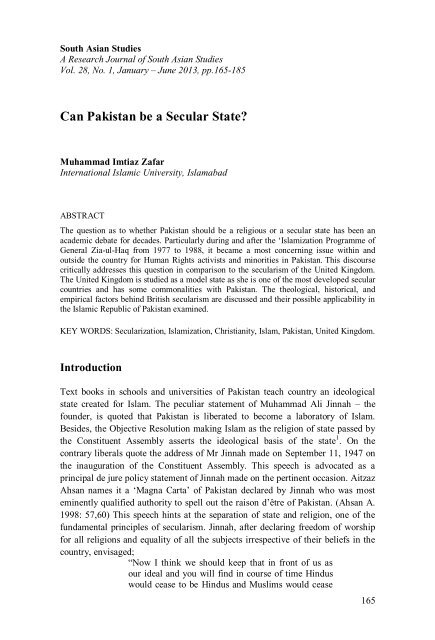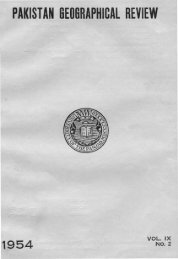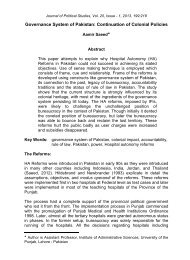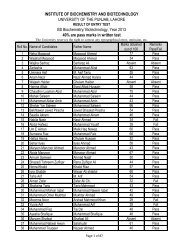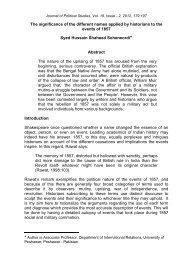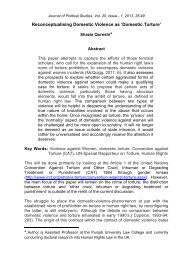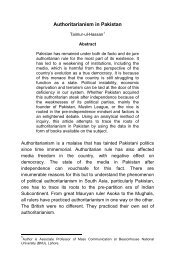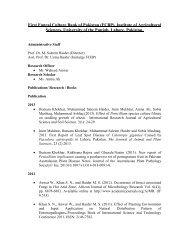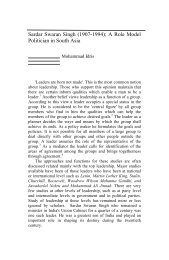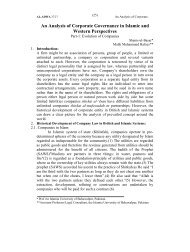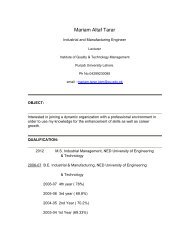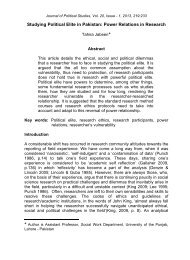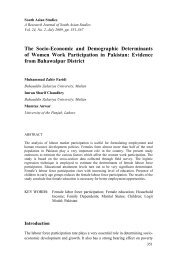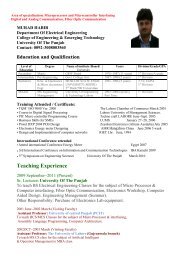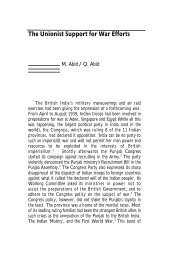Can Pakistan be a Secular State? - University of the Punjab
Can Pakistan be a Secular State? - University of the Punjab
Can Pakistan be a Secular State? - University of the Punjab
Create successful ePaper yourself
Turn your PDF publications into a flip-book with our unique Google optimized e-Paper software.
South Asian Studies<br />
A Research Journal <strong>of</strong> South Asian Studies<br />
Vol. 28, No. 1, January – June 2013, pp.165-185<br />
<strong>Can</strong> <strong>Pakistan</strong> <strong>be</strong> a <strong>Secular</strong> <strong>State</strong>?<br />
Muhammad Imtiaz Zafar<br />
International Islamic <strong>University</strong>, Islamabad<br />
ABSTRACT<br />
The question as to whe<strong>the</strong>r <strong>Pakistan</strong> should <strong>be</strong> a religious or a secular state has <strong>be</strong>en an<br />
academic debate for decades. Particularly during and after <strong>the</strong> ‘Islamization Programme <strong>of</strong><br />
General Zia-ul-Haq from 1977 to 1988, it <strong>be</strong>came a most concerning issue within and<br />
outside <strong>the</strong> country for Human Rights activists and minorities in <strong>Pakistan</strong>. This discourse<br />
critically addresses this question in comparison to <strong>the</strong> secularism <strong>of</strong> <strong>the</strong> United Kingdom.<br />
The United Kingdom is studied as a model state as she is one <strong>of</strong> <strong>the</strong> most developed secular<br />
countries and has some commonalities with <strong>Pakistan</strong>. The <strong>the</strong>ological, historical, and<br />
empirical factors <strong>be</strong>hind British secularism are discussed and <strong>the</strong>ir possible applicability in<br />
<strong>the</strong> Islamic Republic <strong>of</strong> <strong>Pakistan</strong> examined.<br />
KEY WORDS: <strong>Secular</strong>ization, Islamization, Christianity, Islam, <strong>Pakistan</strong>, United Kingdom.<br />
Introduction<br />
Text books in schools and universities <strong>of</strong> <strong>Pakistan</strong> teach country an ideological<br />
state created for Islam. The peculiar statement <strong>of</strong> Muhammad Ali Jinnah – <strong>the</strong><br />
founder, is quoted that <strong>Pakistan</strong> is li<strong>be</strong>rated to <strong>be</strong>come a laboratory <strong>of</strong> Islam.<br />
Besides, <strong>the</strong> Objective Resolution making Islam as <strong>the</strong> religion <strong>of</strong> state passed by<br />
<strong>the</strong> Constituent Assembly asserts <strong>the</strong> ideological basis <strong>of</strong> <strong>the</strong> state 1 . On <strong>the</strong><br />
contrary li<strong>be</strong>rals quote <strong>the</strong> address <strong>of</strong> Mr Jinnah made on Septem<strong>be</strong>r 11, 1947 on<br />
<strong>the</strong> inauguration <strong>of</strong> <strong>the</strong> Constituent Assembly. This speech is advocated as a<br />
principal de jure policy statement <strong>of</strong> Jinnah made on <strong>the</strong> pertinent occasion. Aitzaz<br />
Ahsan names it a ‘Magna Carta’ <strong>of</strong> <strong>Pakistan</strong> declared by Jinnah who was most<br />
eminently qualified authority to spell out <strong>the</strong> raison d’être <strong>of</strong> <strong>Pakistan</strong>. (Ahsan A.<br />
1998: 57,60) This speech hints at <strong>the</strong> separation <strong>of</strong> state and religion, one <strong>of</strong> <strong>the</strong><br />
fundamental principles <strong>of</strong> secularism. Jinnah, after declaring freedom <strong>of</strong> worship<br />
for all religions and equality <strong>of</strong> all <strong>the</strong> subjects irrespective <strong>of</strong> <strong>the</strong>ir <strong>be</strong>liefs in <strong>the</strong><br />
country, envisaged;<br />
“Now I think we should keep that in front <strong>of</strong> us as<br />
our ideal and you will find in course <strong>of</strong> time Hindus<br />
would cease to <strong>be</strong> Hindus and Muslims would cease<br />
165
South Asian Studies 28 (1)<br />
to <strong>be</strong> Muslims, not in <strong>the</strong> religious sense <strong>be</strong>cause that<br />
is <strong>the</strong> personal faith <strong>of</strong> <strong>the</strong> individual, but in <strong>the</strong><br />
political sense as citizens <strong>of</strong> <strong>the</strong> state” (Bolitho<br />
1954:197).<br />
In <strong>the</strong> history <strong>of</strong> earlier three decades <strong>of</strong> <strong>Pakistan</strong>, this li<strong>be</strong>ral religious<br />
controversy had not <strong>be</strong>en <strong>the</strong> major subject <strong>of</strong> national debates. It surfaced with<br />
<strong>the</strong> Islamization era <strong>of</strong> General Zia ul-Haq. A num<strong>be</strong>r <strong>of</strong> legislations including <strong>the</strong><br />
Blasphemy Laws towards Islamization <strong>of</strong> laws and society brought back <strong>the</strong><br />
disputed question <strong>of</strong> <strong>the</strong> nature <strong>of</strong> state. These were major points <strong>of</strong> concern for<br />
non-Muslim minorities and were particularly rejected by li<strong>be</strong>rals (Bouma 1981).<br />
Although <strong>the</strong> National Assembly has revisited <strong>the</strong> amendments implemented in <strong>the</strong><br />
Zia’s regime, <strong>the</strong> changes in <strong>the</strong> blasphemy law seems to <strong>be</strong> a hardest nut to crack,<br />
particularly in contemporary terroristic-laden scenario <strong>of</strong> <strong>the</strong> country.<br />
<strong>Pakistan</strong>’s blasphemy law has <strong>be</strong>en criticized as too broad, and many legal<br />
experts say it has <strong>be</strong>en badly misused since its introduction in <strong>the</strong> 1980s. Recently,<br />
opponents <strong>of</strong> <strong>the</strong> law in government, Mr Salman Taseer, governor <strong>of</strong> <strong>Punjab</strong>, and<br />
Mr Shahbaz Bhati, federal minister <strong>of</strong> Minority Affairs were murdered in January<br />
and March 2011 respectively. Both <strong>of</strong> <strong>the</strong> murdered men were advocates <strong>of</strong> li<strong>be</strong>rty<br />
and reform <strong>of</strong> <strong>Pakistan</strong>’s blasphemy law, which carries a death sentence for those<br />
who insult Islam 2 .<br />
This circumstance has <strong>be</strong>en a point <strong>of</strong> concern for human rights activists,<br />
within and outside <strong>of</strong> <strong>the</strong> country. Particularly in <strong>the</strong> Western world, where<br />
publication <strong>of</strong> The Satanic Verses and painting caricatures <strong>of</strong> <strong>the</strong> person <strong>of</strong> <strong>the</strong><br />
Prophet are seen as part <strong>of</strong> <strong>the</strong> literary achievements, it is considered to <strong>be</strong> barbaric<br />
to kill someone who has just hinted to disregard sacred persons or things. It is<br />
against <strong>the</strong> fundamental right <strong>of</strong> expression <strong>of</strong> opinion as well. I. A. Rehman<br />
advocated, “It is retrogressive piece <strong>of</strong> legislation, inconsistent with <strong>the</strong> spirit <strong>of</strong><br />
<strong>the</strong> age, which calls for toleration, accommodation, and free inquiry as well as a<br />
mechanism for silencing dissent” (Rehman I.A. 1998: 196-204).<br />
<strong>Can</strong> a traditional orthodox society like <strong>Pakistan</strong> progress to <strong>the</strong> extent to<br />
accommodate freedom <strong>of</strong> expression at <strong>the</strong> level <strong>of</strong> <strong>the</strong> West? This <strong>be</strong>comes<br />
relevant in <strong>the</strong> context <strong>of</strong> <strong>the</strong> amendment in Huduud Laws regarding Zina in<br />
President Musharaf’s regime 3 . If Qur’anic injunctions have <strong>be</strong>en diluted as<br />
‘Islamists’ claim <strong>the</strong>n will it <strong>be</strong> <strong>the</strong>ologically feasible to repeal <strong>the</strong> Blasphemy law,<br />
based on juristic interpretation, according to some scholars? 4<br />
If religion, as a matter <strong>of</strong> fact <strong>be</strong>came more and more defensive and selfprotective<br />
in Britain, against <strong>the</strong> pace <strong>of</strong> modernization, what are <strong>the</strong> chances <strong>of</strong><br />
<strong>the</strong> disappearance <strong>of</strong> <strong>the</strong> Islamic fundamentalists in <strong>Pakistan</strong>? It requires<br />
comparative analysis <strong>of</strong> historical experiences and cultural developments <strong>of</strong> both<br />
societies. Although France is more entrenched in secularism to portrait but <strong>the</strong>re<br />
are a num<strong>be</strong>r <strong>of</strong> underpinnings to make Britain a model to compare <strong>the</strong><br />
‘religiosity’ <strong>of</strong> <strong>Pakistan</strong> and ‘secularity’ <strong>of</strong> Britain. For example, both countries<br />
have a common period <strong>of</strong> relationship in history. Although that relationship was <strong>of</strong><br />
a master and a slave type, no o<strong>the</strong>r Western secular country has this common<br />
166
Muhammad Imtiaz Zafar<br />
<strong>Can</strong> <strong>Pakistan</strong> <strong>be</strong><br />
historical legacy with <strong>Pakistan</strong>. Islam is <strong>the</strong> religion <strong>of</strong> 97% <strong>of</strong> <strong>the</strong> people <strong>of</strong><br />
<strong>Pakistan</strong> and <strong>the</strong> second largest religion <strong>of</strong> Britain 5 . Similarly, <strong>the</strong> largest ethnic<br />
group in British Muslims come from <strong>Pakistan</strong>. Blasphemy law, although nominal,<br />
in <strong>the</strong> British Constitution speaks for a sign <strong>of</strong> commonality with <strong>Pakistan</strong> and<br />
invites one to examine British ‘religiosity verses secularity’ in detail. Reactions<br />
and demonstrations <strong>of</strong> British Muslims on <strong>the</strong> occasion <strong>of</strong> ‘Rushdie Affair’ and <strong>the</strong><br />
response <strong>of</strong> Anglican British government is also a moot point to reflect upon.<br />
England is one <strong>of</strong> <strong>the</strong> established tolerant countries. She had gone through a<br />
pertinent process <strong>of</strong> accommodating Catholics, Radical Sects and Dissenting<br />
Churches since <strong>the</strong> 17th century. It has earned herself a significant fame in <strong>the</strong><br />
history <strong>of</strong> religious tolerance. <strong>Can</strong> this <strong>be</strong> dreamed for in <strong>Pakistan</strong>?<br />
Britain as a secular Country<br />
Elaboration <strong>of</strong> <strong>the</strong> essence <strong>of</strong> British secularism needs to answer <strong>the</strong> following<br />
questions: What is secularism and how is it different from religionism? When did<br />
<strong>the</strong> process <strong>of</strong> secularism start? Why and how did it come about?<br />
What is secularism?<br />
<strong>Secular</strong>ization was used more widely to denote <strong>the</strong> marginalization <strong>of</strong> religion<br />
in modern western societies. Hugh McLeod opines that although <strong>the</strong> concept <strong>of</strong><br />
secularization was introduced by W. E. H. Lecky in 1865 and Ro<strong>be</strong>rt and Helen<br />
Lund in 1929, two books played a decisive role in popularizing <strong>the</strong> concept: The<br />
<strong>Secular</strong> City (1965) by Harvey Cox and Religion in <strong>Secular</strong> Society (1966) by<br />
Bryan Wilson. (McLeod 2000a: 653) Harvey Cox observes “secularization as a<br />
process and a field <strong>of</strong> human exploration and endeavour from which <strong>the</strong> gods have<br />
fled. The world has <strong>be</strong>come man’s task and man’s responsibility. Contemporary<br />
man has <strong>be</strong>come cosmopolitan. The world has <strong>be</strong>come his city and his city has<br />
reached out to include <strong>the</strong> world and this is secularization”.(Cox H. 1990: 1-2)<br />
Cox says, “It is <strong>the</strong> loosing <strong>of</strong> <strong>the</strong> world from religious and quasi-religious<br />
understandings <strong>of</strong> life, <strong>the</strong> dispelling <strong>of</strong> all closed worldviews, <strong>the</strong> breaking <strong>of</strong> all<br />
supernatural myths and sacred symbols. <strong>Secular</strong>ization occurs when man turns his<br />
attention away from worlds <strong>be</strong>yond and toward this world and this time (saeculum<br />
= ‘this present age’). It is what Dietrich Bonohoeffer in 1944 called ‘man’s<br />
coming <strong>of</strong> age’” (Cox H. 1990: 1-2). Similarly Bryan Wilson’s main contention is<br />
that although religion may not have disappeared it had <strong>be</strong>come irrelevant:<br />
<strong>Secular</strong>ization is a process whereby religious thinking, practice and institutions<br />
lose social significance (McLeod H. 2000: 653). Giulio Ercolessi and Ingemund<br />
Hägg stated that secularisation is indeed a historical, social and cultural<br />
phenomenon, related to <strong>the</strong> process <strong>of</strong> ‘disenchantment <strong>of</strong> <strong>the</strong> world’ that gave<br />
birth to <strong>the</strong> modern Western society. So <strong>the</strong> secularisation is <strong>the</strong> social process <strong>of</strong><br />
167
South Asian Studies 28 (1)<br />
weakening and decline <strong>of</strong> religious <strong>be</strong>liefs and practices (Ercolessi G. and Hägg I.<br />
2008:6). In a nutshell, secularism divorces religion from all aspects <strong>of</strong> man’s life<br />
and society.<br />
When did <strong>the</strong> process <strong>of</strong> secularism start in Britain?<br />
A good num<strong>be</strong>r <strong>of</strong> sociologists and historians concur on <strong>the</strong> decline <strong>of</strong> British<br />
Christianity. The only question has <strong>be</strong>en <strong>the</strong> date <strong>of</strong> <strong>the</strong> <strong>be</strong>ginning <strong>of</strong> <strong>the</strong> process.<br />
Did it start from <strong>the</strong> Enlightenment period or from <strong>the</strong> emergence <strong>of</strong> <strong>the</strong> industrial<br />
revolution? Is it <strong>the</strong> gift <strong>of</strong> modernism or <strong>the</strong> fruit <strong>of</strong> postmodernism? Callum<br />
Brown and Michael Snape state that “Historians and sociologists agree that this<br />
was a long term process, one that had certainly gotten under way in <strong>the</strong> eighteenth<br />
century and accelerated fur<strong>the</strong>r in <strong>the</strong> nineteenth century for it to constitute <strong>the</strong><br />
major century <strong>of</strong> secularisation” (Brown C. & Snape M. 2010: 4-5). Gil<strong>be</strong>rt names<br />
<strong>the</strong> Enlightenment and <strong>the</strong> coming eras as <strong>the</strong> post-Christian world’ (Gil<strong>be</strong>rt A.<br />
1980: 20-28) Likewise Hugh McLeod grouped <strong>the</strong> main approaches to answering<br />
<strong>the</strong> questions <strong>of</strong> secularization under <strong>the</strong> headings <strong>of</strong> ‘The march <strong>of</strong> science’,<br />
‘Modernisation’, ‘Postmodernity’ and ‘Selling <strong>of</strong> God’ (McLeod H. 2000: 3-12).<br />
Enlightenment<br />
The eighteenth-century Enlightenment emerged as a milestone <strong>of</strong> <strong>the</strong> European<br />
journey towards secularisation. The hegemony <strong>of</strong> <strong>the</strong> clergy and Christian<br />
teachings upon <strong>the</strong> human mind started to crumble. Science surfaced to replace <strong>the</strong><br />
old patterns <strong>of</strong> thinking and it rose as a dominant way <strong>of</strong> understanding <strong>the</strong> world.<br />
The ground was prepared by scientists like Copernicus, Galileo and Newton and<br />
philosophers such as Descartes, Lock and Hume. Alan Gil<strong>be</strong>rt presenting<br />
scientism as an argument <strong>of</strong> this ‘march <strong>of</strong> science’ elaborated that “<strong>the</strong> impact <strong>of</strong><br />
science on popular consciousness certainly had <strong>be</strong>en one <strong>of</strong> <strong>the</strong> central <strong>the</strong>mes in<br />
its evolution” (Gil<strong>be</strong>rt A. 1980: 36). Similarly, Yves Lam<strong>be</strong>rt deli<strong>be</strong>rates that “if<br />
on <strong>the</strong> one hand, <strong>the</strong> exercise <strong>of</strong> reason led to <strong>the</strong> contesting <strong>of</strong> primacy <strong>of</strong><br />
revelation and religious authority, on <strong>the</strong> o<strong>the</strong>r hand, <strong>the</strong> development <strong>of</strong> science<br />
and technology revolutionised <strong>the</strong> ways <strong>of</strong> seeing and living” (McLeod H. 2004:<br />
67).<br />
Modernisation<br />
Modernisation is <strong>the</strong> epitome <strong>of</strong> industrialization; it highlights secularisation in<br />
social milieu ra<strong>the</strong>r than <strong>the</strong> intellectual sphere. The industrialization resulted in<br />
<strong>the</strong> demographic influx from rural to urban/ industrial settings. This migration was<br />
<strong>the</strong> natural end <strong>of</strong> this new development. This rural urban move exposed people<br />
168
Muhammad Imtiaz Zafar<br />
<strong>Can</strong> <strong>Pakistan</strong> <strong>be</strong><br />
not only to new avenues <strong>of</strong> earning, new rules <strong>of</strong> labour and new ethics <strong>of</strong> work<br />
but to a new individuality and new identity. They found <strong>the</strong>ir uniqueness and<br />
distinctiveness. They more or less got rid <strong>of</strong> <strong>the</strong> slavery <strong>of</strong> <strong>the</strong> traditional system <strong>of</strong><br />
landlord ship. As peasants <strong>the</strong>y were totally dependent on <strong>the</strong> landlord. The<br />
landlords <strong>of</strong> past had <strong>the</strong>ir pertinent exploitive culture – <strong>the</strong> Bourgeoisie thinking.<br />
It was all on his wish and whim to give or not to give <strong>the</strong> agreed or o<strong>the</strong>rwise<br />
share from <strong>the</strong> seasonal/annual yields. Even after hard work <strong>of</strong> <strong>the</strong> whole cropping<br />
season <strong>the</strong> farmer was not sure to have expected yield. They had to pray to G/gods<br />
to keep <strong>the</strong> wea<strong>the</strong>r friendly and conducive for <strong>the</strong> proper returns <strong>of</strong> <strong>the</strong>ir hard<br />
work. While coming to urban centres and getting employment in mills and<br />
factories, <strong>the</strong>ir fatalistic nature changed into a realistic tone. They got <strong>the</strong> wages as<br />
was agreed <strong>be</strong>tween <strong>the</strong> owner <strong>of</strong> <strong>the</strong> mill and <strong>the</strong> worker. It gave <strong>the</strong>m a new self.<br />
They even did not need G/god’s interference for getting <strong>the</strong>ir wages. God<br />
practically <strong>be</strong>came irrelevant. Britain has a privilege that <strong>the</strong> major winner in <strong>the</strong><br />
war <strong>of</strong> science and religion was born here in <strong>the</strong> middle <strong>of</strong> <strong>the</strong> nineteenth century.<br />
Charles Darwin laid <strong>the</strong> basis for a radically new way <strong>of</strong> looking at humanity and<br />
declared that human kind is a product <strong>of</strong> physical and historical process ra<strong>the</strong>r than<br />
<strong>be</strong>ing made in <strong>the</strong> image <strong>of</strong> God, and is subject to <strong>the</strong> same laws as <strong>the</strong> rest <strong>of</strong><br />
nature. In this ‘<strong>the</strong> march <strong>of</strong> science’ era, not only metaphysical but societal<br />
phenomenon <strong>be</strong>came subject <strong>of</strong> scientific enquiry. Similarly, philosophers <strong>of</strong> <strong>the</strong><br />
century like Her<strong>be</strong>rt Spencer and August Comte delineated <strong>the</strong> evolutionary<br />
thinking patterns <strong>of</strong> human <strong>be</strong>ings. They advocated that <strong>the</strong> scale <strong>of</strong> human<br />
thought has <strong>be</strong>come positive leaving <strong>be</strong>hind <strong>the</strong> spiritual and metaphysical patterns<br />
in <strong>the</strong> dust <strong>of</strong> history.<br />
Postmodernity<br />
Postmodernity is <strong>the</strong> major <strong>the</strong>me <strong>of</strong> <strong>the</strong> nineteenth and <strong>the</strong> first half <strong>of</strong> <strong>the</strong><br />
twentieth century and that ends on long sixties – when <strong>the</strong> real secularization took<br />
place. It perpetuated <strong>the</strong> traditional centrality <strong>of</strong> religion and churches although<br />
<strong>the</strong>re had <strong>be</strong>en a considerable decline in church attendance in this period. People<br />
still continued to marry in <strong>the</strong> churches, <strong>the</strong>ir children baptised and <strong>the</strong>y sent <strong>the</strong>ir<br />
children to Sunday schools for catechism classes. Along with that moral influence<br />
<strong>of</strong> <strong>the</strong> Christian churches was great on <strong>the</strong> people. Dictates <strong>of</strong> <strong>the</strong> ethical and moral<br />
teachings was eminent in <strong>the</strong> general <strong>be</strong>haviour <strong>of</strong> people although many people<br />
did not practise <strong>the</strong>se standards very strictly. Callum Brown says, “Particularly,<br />
<strong>the</strong> years <strong>be</strong>tween <strong>the</strong> two world wars, reemphasised moral conservatives<br />
disconnecting from <strong>the</strong> li<strong>be</strong>ralisation <strong>of</strong> Victorian religious Puritanism. The British<br />
people in <strong>the</strong> later stages <strong>of</strong> <strong>the</strong> Second World War started to show signs <strong>of</strong><br />
responsiveness to a renewed conservatism in morality. The war undoubtedly put<br />
pressure on sexual purity, strained abstinence from alcohol and undermined some<br />
values <strong>of</strong> <strong>the</strong> early twentieth century Britain. Austerity <strong>be</strong>came <strong>the</strong> watchdog <strong>of</strong><br />
<strong>the</strong> age, defining a period when in <strong>the</strong> economy, in leisure, in family and in<br />
169
South Asian Studies 28 (1)<br />
personal life, people’s <strong>be</strong>haviour was characterised by restraint and duty” (Brown<br />
C. 2006: 177-179). Michael Snape insists that “even in decline <strong>of</strong> religious<br />
practice should not blind us to <strong>the</strong> fact that, even at this later date, British society<br />
was still identifiably and self-consciously Christian” (Snaps M. 2005: 20).<br />
Long Sixties<br />
Nineteen sixties have <strong>be</strong>en treated as a hallmark <strong>of</strong> <strong>the</strong> irreligiosity when <strong>the</strong><br />
decline <strong>of</strong> religious practice had <strong>be</strong>en much more rapid in Britain. Callum Brown<br />
determines <strong>the</strong>se long sixties revolution in years <strong>of</strong> 1956-1973 (Brown C. 2006:<br />
224-227). He wrote <strong>the</strong>se are <strong>the</strong> years when “religion started to stop mattering in<br />
<strong>the</strong> 1960s British society as compare to <strong>the</strong> 1950s and <strong>the</strong> pre-fifties when it<br />
mattered significantly and deeply” (Brown C. 2001: 7). Main indicators <strong>of</strong><br />
secularization were churches in crises, non sacralisation <strong>of</strong> rites de passage and<br />
ascendancy <strong>of</strong> impiety. Callum Brown narrated, “The crisis in <strong>the</strong> church was<br />
reflected in <strong>the</strong> fact that Church mem<strong>be</strong>rship remained only 33% <strong>of</strong> <strong>the</strong> total<br />
populace. By <strong>the</strong> year 2000 less than 8% <strong>of</strong> people attended Sunday worship in<br />
any week and not as much <strong>of</strong> a tenth <strong>of</strong> children attended Sunday school”. (Brown<br />
C. 2001: 3) He fur<strong>the</strong>r wrote that Churches were in short <strong>of</strong> recruits to <strong>be</strong> priests<br />
and ministers and it resulted in <strong>the</strong> prediction <strong>of</strong> <strong>the</strong> demise <strong>of</strong> <strong>the</strong> Church <strong>of</strong><br />
Scotland by 2033 due to loss <strong>of</strong> mem<strong>be</strong>rship. Similarly fewer than half <strong>of</strong> couples<br />
get married in <strong>the</strong> Church and statistics display that if 72% <strong>of</strong> <strong>the</strong> marriages took<br />
place in <strong>the</strong> Church <strong>of</strong> England in 1957 it decreased to 55% in 1997. About 20%<br />
(228 <strong>of</strong> 1000) <strong>of</strong> <strong>the</strong> children were baptised in <strong>the</strong> Church in 1997 as compared to<br />
60% (602 out <strong>of</strong> 1000) in 1956. Cohabitation <strong>of</strong> about one third <strong>of</strong> couples without<br />
marriage pronounces <strong>the</strong> degree <strong>of</strong> moral decay and impiety in <strong>the</strong> society <strong>of</strong> <strong>the</strong><br />
year 2000 (Brown C. 2001:3-7). Pertinent legislation during <strong>the</strong> 1960s reflects this<br />
pace <strong>of</strong> change towards drifting from conservative religious teachings prevalent in<br />
<strong>the</strong> society. The years 1959-1969 witnessed <strong>the</strong>se moves <strong>be</strong>ginning with <strong>the</strong><br />
Obscene Publication Act <strong>of</strong> 1959 which protected scientific and literary work from<br />
prosecution. Restrictions on gambling were relaxed in 1960 and on drinking in<br />
1961. Male homosexuality was decriminalized in 1967. Theatre censorship was<br />
abolished in 1968 and in 1969 divorce law was li<strong>be</strong>ralized. This all extended <strong>the</strong><br />
sphere <strong>of</strong> individual freedom. Hugh McLeod is <strong>of</strong> <strong>the</strong> opinion that <strong>the</strong> trends<br />
established in <strong>the</strong> ‘long 1960s’ set <strong>the</strong> pattern for <strong>the</strong> rest <strong>of</strong> <strong>the</strong> century (McLeod<br />
H. 2007: 218).<br />
Why and how did it come about?<br />
The question as to, why and how can appropriately <strong>be</strong> gleaned from <strong>the</strong> <strong>be</strong>haviour<br />
<strong>of</strong> <strong>the</strong> clergy that held <strong>the</strong> pulpit and had <strong>be</strong>en <strong>the</strong> guardian and <strong>be</strong>neficiary <strong>of</strong><br />
Christendom for centuries. McLeod addressing <strong>the</strong> question narrates that, “since<br />
170
Muhammad Imtiaz Zafar<br />
<strong>Can</strong> <strong>Pakistan</strong> <strong>be</strong><br />
<strong>the</strong> French Revolution, Christian thought has <strong>be</strong>en powerfully influenced by <strong>the</strong><br />
sense <strong>of</strong> <strong>the</strong> strength <strong>of</strong> <strong>the</strong> secularizing forces in <strong>the</strong> world and most <strong>the</strong>ologians<br />
and church leaders have <strong>be</strong>en aware <strong>of</strong> <strong>the</strong> need to respond to this threat. Four<br />
characteristic strategies, so far, have <strong>be</strong>en witnessed. Firstly, partial acceptance <strong>of</strong><br />
contemporary critiques <strong>of</strong> Christianity and <strong>the</strong> church, and restatement <strong>of</strong> <strong>the</strong> faith<br />
or <strong>of</strong> <strong>the</strong> church’s agenda in terms likely to make <strong>the</strong>m <strong>be</strong>tter understood by<br />
critics. Secondly, total rejection <strong>of</strong> <strong>the</strong>se criticisms and attempts at a wholesale<br />
‘rechristianization’ <strong>of</strong> <strong>the</strong> society. The third approach was welcoming <strong>of</strong><br />
secularization as facilitating <strong>the</strong> removal <strong>of</strong> harmful aspects <strong>of</strong> Christian <strong>be</strong>lief and<br />
practice and a purification <strong>of</strong> <strong>the</strong> faith. The fourth feature had <strong>be</strong>en accepting <strong>the</strong><br />
fact <strong>of</strong> secularization, toge<strong>the</strong>r with <strong>the</strong> attempt to establish a Christian subculture<br />
within which at least a substantial minority <strong>of</strong> <strong>the</strong> population can <strong>be</strong> protected<br />
from harmful influences. This is reflected in <strong>the</strong> social services like; establishing<br />
schools, publishing newspapers, provision <strong>of</strong> leisure facilities by Catholics and<br />
Protestants Evangelicalism” (McLeod H. 2000a: 654). Alan Gil<strong>be</strong>rt also records<br />
both resistive and accommodative reaction <strong>of</strong> Christian leaders along with <strong>the</strong> note<br />
that secularization, in short’ threatened ei<strong>the</strong>r to marginalize religion or subvert it<br />
(Gil<strong>be</strong>rt A. 1994: 505-506).<br />
Empirical Evidences<br />
The colonial enterprise since 16 th /17 th century, contributed to <strong>the</strong> economic growth<br />
<strong>of</strong> Britain. The Empire controlled over one-quarter <strong>of</strong> <strong>the</strong> world's population and<br />
almost a quarter <strong>of</strong> <strong>the</strong> total land area <strong>of</strong> <strong>the</strong> earth by early nineteen twenties.<br />
Riches <strong>of</strong> <strong>the</strong> world filled <strong>the</strong> treasuries <strong>of</strong> <strong>the</strong> country earned through so called<br />
trade. This economic well<strong>be</strong>ing and prosperity had direct impact on <strong>the</strong> rising<br />
living standards <strong>of</strong> people and it changed family life. The luxuries and comforts<br />
played a major role in <strong>the</strong> decline <strong>of</strong> church attendance. According to ‘Harris Poll’<br />
commissioned by <strong>the</strong> Daily Express in April 1970, too many distractions –<br />
television, bingo, and motor cars, emerged as major counter-religious attractions<br />
(Gil<strong>be</strong>rt A. 1980: 96). The domestic luxuries like television in 96 percent,<br />
refrigerator in 85 percent, and washing machine in 70 percent and telephone in 52<br />
percent <strong>of</strong> British homes were available by 1975. By <strong>the</strong> same year 53 per cent <strong>of</strong><br />
<strong>the</strong> citizens lived in <strong>the</strong>ir own homes (McLeod H. 2007: 102). Motor car as an<br />
easy and swift mode <strong>of</strong> mobility popularized <strong>the</strong> trend <strong>of</strong> country side dwelling<br />
among <strong>the</strong> upper and higher middle classes <strong>of</strong> <strong>the</strong> society.<br />
Similarly a revolution happened in <strong>the</strong> field <strong>of</strong> medical sciences. It changed<br />
<strong>the</strong> traditional view <strong>of</strong> health and medicines. Medical revolution <strong>of</strong> <strong>the</strong> second half<br />
<strong>of</strong> <strong>the</strong> Nineteenth century made it thoroughly pr<strong>of</strong>essional and primitive<br />
superstitious ways <strong>of</strong> treatment almost died out for ever. The phenomenon <strong>of</strong> faith<br />
and spiritual healing <strong>be</strong>came obsolete in common life. Reason <strong>of</strong> ailment and<br />
disease was no more mystery to require supernatural blessings for its treatment.<br />
There were unparallel improvements in nutrition, in <strong>the</strong> prevention and treatment<br />
171
South Asian Studies 28 (1)<br />
<strong>of</strong> diseases and quality <strong>of</strong> infant and child care. Span <strong>of</strong> life increased. Life<br />
expectancy at <strong>the</strong> birth <strong>of</strong> <strong>the</strong> average male was reported to <strong>be</strong> 69.3 and <strong>of</strong> female<br />
was 75.5 in 1975; compared with <strong>the</strong> 29.6 years <strong>of</strong> infant born into aristocracy<br />
about 300 years ago, similarly mortality ratio came down to 16 per 1000 in 1974<br />
as compared to 30 per thousand in 1950 (Gil<strong>be</strong>rt A. 1980: 52-53).<br />
Sexual revolution is a significant characteristic <strong>of</strong> change. It got a new<br />
impetus by <strong>the</strong> arrival <strong>of</strong> <strong>the</strong> oral contraceptive pill. Although it was adopted for<br />
<strong>the</strong> artificial birth controle, in <strong>the</strong> <strong>be</strong>ginning <strong>of</strong> sixties more single teenagers <strong>be</strong>gan<br />
to have sex outside marriage. Interestingly, <strong>the</strong> attitude <strong>of</strong> <strong>the</strong> clergy towards this<br />
immoral change was not <strong>be</strong>lligerent. Ra<strong>the</strong>r <strong>the</strong> Church <strong>of</strong> England and Scotland<br />
and many Protestant clergy welcomed <strong>the</strong> arrival <strong>of</strong> <strong>the</strong> oral contraceptive pill in<br />
1960-1. However, Pope Paul VI banned all artificial contraception as morally<br />
wrong for <strong>the</strong> world’s Catholics in July 1968. Resultantly, in <strong>the</strong> Anglican world,<br />
although sex without marriage was underway in <strong>the</strong> early and mid-1960s <strong>the</strong>re was<br />
rapid increase in <strong>the</strong> 1970s. In 1964, only 15 per cent <strong>of</strong> 16/17 years old girls<br />
claimed to have had sexual intercourse. By 1974-5 <strong>the</strong>se figures had leapt to 58<br />
per cent. Same ratio <strong>of</strong> increase among boys <strong>of</strong> equal age was reported from 40 per<br />
cent to 52 per cent in respective years as narrated by Callum Brown (Callum B.<br />
2006: 242-246).<br />
<strong>Secular</strong> inherence in Christianity<br />
Apart from <strong>the</strong> ‘religious outsiders’, narrated above, one can easily search out<br />
‘religious insiders’ within <strong>the</strong> very form and formation <strong>of</strong> Christianity. Historically<br />
speaking, it can <strong>be</strong> traced from <strong>the</strong> pre Christian era as well as in <strong>the</strong> very<br />
formation <strong>of</strong> <strong>the</strong> Christian religion. Harvey Cox in <strong>the</strong> words <strong>of</strong> Hugh McLeod<br />
“trying to find more meaningful ways <strong>of</strong> writing about God” (McLeod H. 2007:<br />
11) has excavated <strong>the</strong> seed<strong>be</strong>d <strong>of</strong> secularization in <strong>the</strong> Bible. H. Cox advocated<br />
that we must learn, as Bonhe<strong>of</strong>fer said, “to speak <strong>of</strong> God in secular fashion and<br />
find nonreligious interpretation <strong>of</strong> biblical concepts” (Cox H. 1990:3). Harvey Cox<br />
fur<strong>the</strong>r emphasized his argument with reference to a German <strong>the</strong>ologian Friedrich<br />
Gogarten’s understanding that “secularization is <strong>the</strong> legitimate consequence <strong>of</strong><br />
biblical faith on history” (Cox H. 1990: 3). He descri<strong>be</strong>s that <strong>the</strong>re are three<br />
pivotal elements in biblical faith which have each given rise to one aspect <strong>of</strong><br />
secularization. Thus, <strong>the</strong> disenchantment <strong>of</strong> nature <strong>be</strong>gins with creation, <strong>the</strong><br />
desacralization <strong>of</strong> politics with Exodus, and deconsecration <strong>of</strong> values with <strong>the</strong><br />
Sinai covenant, especially with <strong>the</strong> prohibition <strong>of</strong> idols. He concludes as <strong>the</strong><br />
secularization is historically very Christian, so it should not <strong>be</strong> opposed ra<strong>the</strong>r <strong>be</strong><br />
nourished and advocated (Cox H. 1990: 15).<br />
Allan Gil<strong>be</strong>rt on <strong>the</strong> same lines <strong>of</strong> argument expounded that “<strong>the</strong> seeds <strong>of</strong><br />
secularization were implanted at <strong>the</strong> very genesis <strong>of</strong> <strong>the</strong> Judeo-Christian tradition.<br />
Christianity inherited <strong>the</strong> radical <strong>the</strong>ological and cosmological insights <strong>of</strong> ancient<br />
Semitic people, a people with grand yet precarious vision <strong>of</strong> a mono<strong>the</strong>istic<br />
172
Muhammad Imtiaz Zafar<br />
<strong>Can</strong> <strong>Pakistan</strong> <strong>be</strong><br />
universe. Mono<strong>the</strong>ism was a potent, creative cultural force, but its impact on<br />
religious consciousness was two-sided. The sublime religiosity it produced,<br />
enriched first Hebrew and later Christian consciousness; but by setting up a<br />
dichotomy <strong>be</strong>tween sacred and pr<strong>of</strong>ane aspects <strong>of</strong> reality it established an<br />
intellectual frame work within which secularization was almost bound to occur. A<br />
dialectical tension <strong>be</strong>tween religious and secular modes <strong>of</strong> thought <strong>be</strong>came a<br />
fundamental principle <strong>of</strong> Judaism and, through it, <strong>of</strong> Christianity. For, in<br />
discovering <strong>the</strong> transcendent majesty <strong>of</strong> Yahweh – in accepting Him alone as truly<br />
divine – <strong>the</strong> Hebrews gained <strong>the</strong> power gradually to extricate <strong>the</strong>mselves from <strong>the</strong><br />
hegemony <strong>of</strong> ‘false gods’ and <strong>the</strong> mystification <strong>of</strong> paganism. The natural world, a<br />
product <strong>of</strong> divine creativity but not itself divine could now <strong>be</strong> regarded in<br />
mundane, matter-<strong>of</strong>-facts terms” (Gil<strong>be</strong>rt A. 1980: 17-18).<br />
Akin to that is <strong>the</strong> concept <strong>of</strong> <strong>the</strong> Papal infallibility, an evidence <strong>of</strong><br />
desacralization <strong>of</strong> divinity and transferring it to man. It started from <strong>the</strong> Apostle<br />
Peter, who was accorded both by Jesus and <strong>the</strong> early church a position <strong>of</strong><br />
exceptional authority. When pope, particularly in Catholic dogma, as <strong>the</strong> successor<br />
<strong>of</strong> Peter speaks ex ca<strong>the</strong>dra, he possesses <strong>the</strong> infallibility that Christ <strong>be</strong>stowed<br />
upon his church. In reality, papal infallibility remains a subject about which <strong>the</strong>re<br />
is no Christian consensus. This article <strong>of</strong> Christian <strong>the</strong>ological faith is hardly<br />
proved to <strong>be</strong> found in <strong>the</strong> very foundation <strong>of</strong> <strong>the</strong> Holy See in Peter’s life. J.M.R.<br />
Tillard writes that a serious study <strong>of</strong> <strong>the</strong> New Testament thus shows Peter as<br />
formally commissioned by Christ to take <strong>the</strong> lead when fundamental issues<br />
concerning <strong>the</strong> church are at stake. But this commission is always inseparable<br />
from that <strong>of</strong> <strong>the</strong> whole group <strong>of</strong> apostles or disciples. It is also inseparable from<br />
repeated insistence on Peter’s personal weakness, his enduring fallibility, and his<br />
capacity actually to provide false witness. Even nothing is explicitly said, in <strong>the</strong><br />
New Testament, <strong>of</strong> a journey <strong>of</strong> Peter to Rome and his martyrdom in this city. But<br />
<strong>the</strong>re is, both in <strong>the</strong> earliest tradition and in archaeological evidence,<br />
overwhelming support for his presence and death <strong>the</strong>re. The crucial question<br />
remains: was Peter supposed to have a successor? Here again <strong>the</strong> New Testament<br />
is silent (Tillard 2000). The doctrine <strong>of</strong> papal infallibility was first developed by<br />
Franciscan <strong>the</strong>ologians in <strong>the</strong> early fourteenth century. Held by some <strong>the</strong>ologians,<br />
rejected by o<strong>the</strong>rs, it <strong>be</strong>came <strong>the</strong> touchstone <strong>of</strong> ultramontanism (Paul A. 2000).<br />
Apart from <strong>the</strong> controversy <strong>of</strong> <strong>the</strong> person <strong>of</strong> Peter and his infallibility, <strong>the</strong> crux <strong>of</strong><br />
<strong>the</strong> matter is that <strong>the</strong> whole paradigm <strong>of</strong> Catholic <strong>the</strong>ology establishes<br />
desacralization <strong>of</strong> <strong>the</strong> divinity to man, after all Peter was a human <strong>be</strong>ing not God.<br />
Protestant’s position on <strong>the</strong> subject <strong>of</strong> <strong>the</strong> process <strong>of</strong> secularization is not<br />
entirely different. Fundamentals <strong>of</strong> Protestant religion seem to <strong>be</strong> standing on<br />
secular foundations. Godly authority <strong>of</strong> man’s salvation endowed to pope and<br />
priest as deputies <strong>of</strong> God in <strong>the</strong> Catholic faith, was rejected by Martin Lu<strong>the</strong>r. He<br />
said if mastery <strong>of</strong> <strong>the</strong> Scriptures could <strong>be</strong>stow on <strong>the</strong> pope a position to issue a<br />
decree on ordinary Christian’s destiny <strong>the</strong>n qualifies him to seek expiation himself<br />
from his sins through Scriptures. He translated <strong>the</strong> Bible into <strong>the</strong> German language<br />
173
South Asian Studies 28 (1)<br />
for this purpose. Following <strong>the</strong> Lu<strong>the</strong>ran tradition, William Tynedale, produced an<br />
English translation <strong>of</strong> <strong>the</strong> Bible in <strong>the</strong> 1530s. Although he was martyred on this<br />
heresy, <strong>the</strong> question <strong>of</strong> a vernacular Bible was indicative <strong>of</strong> change in Britain.<br />
Soon after that, by 1537, a translation had appeared which gained royal approval,<br />
and <strong>the</strong> royal injunctions <strong>of</strong> <strong>the</strong> following years required a copy to <strong>be</strong> placed in<br />
every parish church (Sheils W.J. 1994: 152).<br />
It is <strong>be</strong>yond doubt that <strong>the</strong> spread <strong>of</strong> Protestantism validated <strong>the</strong><br />
arguments/questions raised by Martin Lu<strong>the</strong>r. This movement as a logical result<br />
impregnated a num<strong>be</strong>r <strong>of</strong> streams <strong>of</strong> free thinking. Thousands <strong>of</strong> contemporary<br />
denominations in Protestant Christianity have <strong>be</strong>come salient feature <strong>of</strong> western<br />
countries. Reason and logic <strong>be</strong>came <strong>the</strong> currency <strong>of</strong> <strong>the</strong> day. David Palin wrote<br />
that, “in disputed cases, reference can <strong>the</strong>n <strong>be</strong> made to something or someone<br />
which is (or ought to <strong>be</strong>) agreed by <strong>the</strong> parties to <strong>be</strong> unquestionably authoritative.<br />
In <strong>the</strong> seventeenth and eighteenth centuries reflective people in England<br />
increasingly looked to reason for such a final authority in matters <strong>of</strong> religious<br />
<strong>be</strong>lief. This adoption <strong>of</strong> <strong>the</strong> way to reason emerged to control fanaticism and<br />
bigotry, to face <strong>the</strong> challenge <strong>of</strong> scepticism and un<strong>be</strong>lief and to restore <strong>the</strong><br />
confidence <strong>of</strong> traditional authorities against religious controversies <strong>be</strong>gun in<br />
sixteenth century” (Palin D. 1994: 210-213) For example, <strong>the</strong> interpretation <strong>of</strong> <strong>the</strong><br />
verses <strong>of</strong> <strong>the</strong> Bible <strong>be</strong>came controversial. In practice each sect assumed <strong>the</strong><br />
authority to interpret and use <strong>the</strong> Bible and to declare <strong>the</strong> fundamentals <strong>of</strong><br />
Christianity. As a result, in <strong>the</strong> words <strong>of</strong> John Locke, “<strong>the</strong> scripture serves but, like<br />
nose <strong>of</strong> wax, to <strong>be</strong> turned and <strong>be</strong>nt, just as may fit <strong>the</strong> contrary orthodoxies <strong>of</strong><br />
different societies” 6 . Whatever <strong>the</strong> justification is given whole movement <strong>of</strong><br />
Protestant religion in fact stands for <strong>the</strong> blunt ‘pr<strong>of</strong>anization’ <strong>of</strong> spirituality and a<br />
brave step towards secularization.<br />
In Britain a popular secularist tradition developed in <strong>the</strong> wake <strong>of</strong> Tom Pain’s<br />
Rights <strong>of</strong> Man (1791-2) and Age <strong>of</strong> Reason (1794-5). It developed an extreme form<br />
<strong>of</strong> artisan radicalism which looked forward to a democratic state in which<br />
authority would <strong>be</strong> de-mystified and powers <strong>of</strong> organized religion broken forever.<br />
Now it looks that <strong>the</strong> way leading to secularism was determined. One <strong>of</strong> <strong>the</strong> major<br />
travelers on this tract was Ro<strong>be</strong>rt Owen (1771-1858). He saw himself as <strong>the</strong><br />
‘prophet’ <strong>of</strong> <strong>the</strong> new age – an age in which <strong>the</strong> divisiveness <strong>of</strong> religion would <strong>be</strong><br />
swept away to permit a rational reordering <strong>of</strong> human society as narrated by<br />
Edward Royle (Royle E. 1994: 408). Second in line was Charles Southwell (1814-<br />
1860), who started a periodical, titled <strong>the</strong> Oracle <strong>of</strong> Reason. In his paper he wrote<br />
an article titled ‘The Jew Book’ and stated that <strong>the</strong> Bible was not <strong>the</strong> product <strong>of</strong><br />
God but <strong>the</strong> outpouring <strong>of</strong> some devil and was prosecuted resultantly for this<br />
blasphemous denunciation <strong>of</strong> <strong>the</strong> Bible. (Nash D. 1999: 92-93) George Jacob<br />
Holyoake (1817-1906) in <strong>the</strong> pursuit <strong>of</strong> reason and rationality ultimately founded<br />
<strong>Secular</strong>ism. Slowly, in <strong>the</strong> 1850s, he <strong>be</strong>gan to make headway and <strong>Secular</strong>ism<br />
caught <strong>the</strong> public imagination. His public debates with congregational ministers<br />
earned him fame. Sale <strong>of</strong> his paper, Reasoner, rose from under one thousand to<br />
174
Muhammad Imtiaz Zafar<br />
<strong>Can</strong> <strong>Pakistan</strong> <strong>be</strong><br />
over five thousand. <strong>Secular</strong>ism as a movement had <strong>be</strong>come a fact <strong>of</strong> some<br />
significance in <strong>the</strong> life <strong>of</strong> Victorian Britain (Royle E. 1994: 406-411). Charles<br />
Bradlaugh (1833 – 1891) is placed in a very significant and peculiar place in <strong>the</strong><br />
parliamentary history <strong>of</strong> Britain. He was time and again elected from Northampton<br />
but was not allowed to <strong>be</strong>come a mem<strong>be</strong>r <strong>of</strong> <strong>the</strong> House <strong>of</strong> Commons. In fact he<br />
refused to take <strong>the</strong> oath as it had no meaning for him. It gave him a status <strong>of</strong><br />
national celebrity, <strong>the</strong> personification <strong>of</strong> radicalism and symbol <strong>of</strong> popular<br />
democratic rights (Royle E. 1994: 414-415). George William Foote (1850 - 1915)<br />
follower <strong>of</strong> <strong>the</strong> secular thinking <strong>be</strong>gan a periodical Freethinker. It was known to<br />
<strong>be</strong> a scurrilous publication which attacked Christianity with bar<strong>be</strong>d wit and savage<br />
humor. Joss Mash ostensibly argues that Foote sought to ‘desacrilize’ <strong>the</strong> Bible<br />
through <strong>the</strong> use <strong>of</strong> literary weapons <strong>of</strong> sarcasm, satire and pr<strong>of</strong>ane image. This is<br />
painted as a project – part li<strong>be</strong>rtarian, part literary – to reduce <strong>the</strong> Bible merely to<br />
<strong>the</strong> status <strong>of</strong> a text (Nash D. 1999: 108).<br />
Long sixty’s; <strong>the</strong> hallmark <strong>of</strong> secularization in Britain produced a most<br />
controversial book <strong>of</strong> li<strong>be</strong>ral <strong>the</strong>ology by John Robinson, <strong>the</strong> Anglican Bishop <strong>of</strong><br />
Woolwich. Honest to God published in 1963 placed God within humans, not<br />
outside <strong>of</strong> <strong>the</strong>m or <strong>the</strong>ir world, with Christianity to <strong>be</strong> understood in <strong>the</strong> form <strong>of</strong> a<br />
‘naturalism’ ra<strong>the</strong>r than a ‘supernaturalism’. This heretical book, as some saw,<br />
descri<strong>be</strong>d <strong>the</strong> notion <strong>of</strong> heaven ‘as <strong>the</strong> greatest obstacle to an intelligent faith’ and<br />
emphasized God in our loving and ethical actions ra<strong>the</strong>r than in <strong>the</strong> next world and<br />
its promises. Dr Michael Ramsey, <strong>the</strong> Archbishop <strong>of</strong> <strong>Can</strong>terbury commented on<br />
Robinson’s imagery <strong>of</strong> God as ‘utterly wrong’ and wrote ‘strange, difficult and<br />
revolutionary’ in his pamphlet Image Old and New (Brown C. 2006: 232-233).<br />
Britain is a Religious Country<br />
Having said all about <strong>the</strong> secularization <strong>of</strong> Britain, explicit in <strong>the</strong> decline <strong>of</strong><br />
Church mem<strong>be</strong>rship and people’s distancing from <strong>the</strong> practice <strong>of</strong> religious rituals<br />
in life cycle, it is not out <strong>of</strong> place to say that many symptoms and indicators still<br />
depict <strong>the</strong> ‘survivability’ <strong>of</strong> Christianity in England. Religious pluralism and <strong>the</strong><br />
coming <strong>of</strong> Eastern religions discourage one to proclaim <strong>the</strong> loosing significance <strong>of</strong><br />
<strong>be</strong>lief in social life <strong>of</strong> people. It is also true <strong>of</strong> Christian’s parts <strong>of</strong> Christendom<br />
who are settled here especially from Africa. Even <strong>the</strong> debate on <strong>the</strong> ‘dynamics <strong>of</strong><br />
implicit religion’ is opening new avenues to sense <strong>the</strong> existence <strong>of</strong> religion in<br />
British culture. Lewis Christopher writes that Edward Bailey, one <strong>of</strong> <strong>the</strong> main<br />
conceiver <strong>of</strong> <strong>the</strong> idea <strong>of</strong> implicit religion, in his article “Implicit Religion in<br />
Contemporary Society”, 1997 and <strong>the</strong> book Implicit Religion: An Introduction<br />
1998 refers to ‘implicit religion’ as those aspects <strong>of</strong> ordinary life, which seem to<br />
contain an inherently religious element within <strong>the</strong>m, whe<strong>the</strong>r or not <strong>the</strong>y are<br />
expressed in ways that are traditionally descri<strong>be</strong>d as ‘religious’. Bailey defines it<br />
in three ways, as ‘commitment’; ‘integrating foci’; and ‘intensive concerns with<br />
extensive effects’ (Bailey E. 2005). Similarly Grace Davie pleads that “religion is<br />
175
South Asian Studies 28 (1)<br />
not only attendance and mem<strong>be</strong>rship <strong>of</strong> a church but <strong>the</strong>re is, however, ano<strong>the</strong>r<br />
way <strong>of</strong> looking at things. If we widen <strong>the</strong> definition <strong>of</strong> religion to include <strong>the</strong><br />
questions about <strong>the</strong> meaning <strong>of</strong> life, <strong>the</strong> purpose <strong>of</strong> mankind’s existence, <strong>the</strong> future<br />
<strong>of</strong> <strong>the</strong> planet and a human <strong>be</strong>ing’s responsibilities to his fellow human <strong>be</strong>ing and<br />
to <strong>the</strong> earth itself, we may find a very different pattern <strong>of</strong> religious <strong>be</strong>havior among<br />
<strong>the</strong> young. The evidence remains largely impressionistic but it seems likely that<br />
<strong>the</strong> 18-24 age-group may respond to <strong>the</strong>se pr<strong>of</strong>ound ecological, moral, ethical (and<br />
surely religious) issues much more positively than <strong>the</strong>y do to traditional religious<br />
instruction. Bearing this in mind, we might suggest <strong>the</strong> following ra<strong>the</strong>r tentative<br />
conclusion: religion and religious values are not so much disappearing among<br />
young people as <strong>be</strong>ing redirected. This redirection is, none<strong>the</strong>less, altering (very<br />
pr<strong>of</strong>oundly) <strong>the</strong> relationship <strong>be</strong>tween popular <strong>be</strong>lief and <strong>the</strong> institutional churches<br />
that is - surely - <strong>the</strong> relationship <strong>be</strong>tween <strong>be</strong>lieving and <strong>be</strong>longing. And it<br />
characterizes what might <strong>be</strong> termed <strong>the</strong> ‘implicit religion’ <strong>of</strong> British people in <strong>the</strong><br />
last decades <strong>of</strong> <strong>the</strong> 20th century” (Davie G. 1990).<br />
Talal Asad’s enquiry looks to <strong>be</strong> revealing raising <strong>the</strong> question as to whe<strong>the</strong>r<br />
anthropology as such contributes anything to <strong>the</strong> clarification <strong>of</strong> questions about<br />
secularism. He explains that, “most anthropologists are taught that <strong>the</strong>ir discipline<br />
is essentially defined by research technique (participant observation) carried out in<br />
a circumscri<strong>be</strong>d field, and that as such it deals with particularly – with what<br />
Clifford Geertz, following <strong>the</strong> philosopher Gil<strong>be</strong>rt Ryle, called ‘thick description”<br />
(Asad T. 2003:16). Clifford Geertz states that, “in anthropology, what <strong>the</strong><br />
practioners do is ethnography. The actual nature <strong>of</strong> ethnography is to do ‘thick<br />
descriptions’ that can <strong>be</strong> said to provide context and meaning to observed actions,<br />
ra<strong>the</strong>r than simply recording <strong>the</strong> occurrence <strong>of</strong> an event in isolation. It is more<br />
about recording <strong>the</strong> story <strong>of</strong> a fact, ra<strong>the</strong>r than <strong>the</strong> fact itself. It is <strong>the</strong> kind <strong>of</strong><br />
intellectual effort, an elaborate venture in ‘thick description’ <strong>of</strong> culture. Culture is<br />
a self-contained ‘super-organic’ reality with forces and purposes <strong>of</strong> its own; that is,<br />
to reify it” (Geertz C. 1973: 5-11). Referring to Ward Goodenough, Geertz writes<br />
that Culture (is located) in <strong>the</strong> minds and hearts <strong>of</strong> men (Ibid). Akin to that<br />
Norman Denzin perceives ‘thick description’ consisting <strong>of</strong> four features: first <strong>the</strong><br />
‘thick description’ gives <strong>the</strong> context <strong>of</strong> an act; second, states <strong>the</strong> intentions and<br />
meanings that organizes <strong>the</strong> action; third, traces <strong>the</strong> evolution and development <strong>of</strong><br />
<strong>the</strong> act and fourth, presents <strong>the</strong> action as a text that can <strong>the</strong>n <strong>be</strong> interpreted. A ‘thin<br />
description’ however, simply reports facts, independent <strong>of</strong> intentions or <strong>the</strong><br />
circumstances that surround an action (1989). In his article, “Religion as a Cultural<br />
System”, Clifford Geertz defines religion, “as (1) a system <strong>of</strong> symbols which acts<br />
to (2) establish powerful, pervasive and long lasting moods and motivations in<br />
men by (3) formulating conceptions <strong>of</strong> general order <strong>of</strong> existence and (4) clothing<br />
<strong>the</strong>se conceptions with such an aura <strong>of</strong> factuality that (5) <strong>the</strong> moods and<br />
motivations seem uniquely realistic” (Geertz C. 1973: 90).<br />
It is not arguable that human to human relationship is no more normative but<br />
is based on commercial terms due to “<strong>the</strong> depersonalization <strong>of</strong> urban life as an<br />
176
Muhammad Imtiaz Zafar<br />
<strong>Can</strong> <strong>Pakistan</strong> <strong>be</strong><br />
anonymous shape <strong>of</strong> secular city in <strong>the</strong> West” (Cox H.: 1990: 34-43). Similarly,<br />
human <strong>be</strong>ing generally has manipulated nature to <strong>the</strong> extent <strong>of</strong> its misuse and has<br />
made it an impending threat for his own life and <strong>the</strong> life <strong>of</strong> <strong>the</strong> glo<strong>be</strong> by disrupting<br />
<strong>the</strong> ozone lyer. But can it <strong>be</strong> refuted that Jesus is still automatically ra<strong>the</strong>r<br />
intrinsically uttered by common Christian on <strong>the</strong> moments <strong>of</strong> fear and urgency?<br />
“So also is <strong>the</strong> Cross, talked about, visualized, shaped worriedly in air or fondly<br />
fingered at <strong>the</strong> neck. They are symbolic or at least symbolic elements, <strong>be</strong>cause<br />
<strong>the</strong>y are tangible formulations <strong>of</strong> notions, abstractions from experience fixed in<br />
perceptible forms, concrete embodiments <strong>of</strong> ideas, attitudes, judgments, longings<br />
or <strong>be</strong>liefs” (Geertz C.: 1973:91). Besides <strong>the</strong> fact, all <strong>the</strong> religious rituals practised<br />
in significant events <strong>of</strong> life cycle are no more commonly <strong>be</strong>ing witnessed in<br />
British society but funerals and burials are a different story. Blacks, Irish,<br />
Catholics predominantly and Anglicans mostly if not all <strong>of</strong> <strong>the</strong>m, are very<br />
particular to have religious service on death. It is burial or cremation something<br />
from <strong>the</strong> religion ei<strong>the</strong>r reciting from <strong>the</strong> Bible, or hymns, or prayer by <strong>the</strong><br />
minister/priest are usually essential part <strong>of</strong> <strong>the</strong> ceremony. This is perhaps <strong>the</strong><br />
deepest rooted religious element in <strong>the</strong> social fabric <strong>of</strong> <strong>the</strong> society. Religion in<br />
Victorian Britain was so significant that England’s most famous agnostic, Charles<br />
Darwin, was given a Christian burial in <strong>the</strong> Westminster Ab<strong>be</strong>y (McLeod H.<br />
2000:262). Are <strong>the</strong>se modes and motivations not looking askance on <strong>the</strong><br />
survivability <strong>of</strong> religion in <strong>the</strong> lives <strong>of</strong> ordinary English people? In Britain, <strong>the</strong>re is<br />
total separation in politics and religion; and it is <strong>the</strong> fact that laws are not made<br />
under religious injunctions but is <strong>the</strong> permanent mem<strong>be</strong>rship <strong>of</strong> 14 Anglican<br />
Bishops in <strong>the</strong> House <strong>of</strong> Lords not enough to conceive a symbolic significance <strong>of</strong><br />
national religious disposition? The very presence <strong>of</strong> blasphemy law in <strong>the</strong><br />
constitution, although only for <strong>the</strong> protection <strong>of</strong> <strong>the</strong> Anglican Church, not<br />
sufficient to pronounce <strong>of</strong>ficial position <strong>of</strong> <strong>the</strong> religiousness <strong>of</strong> <strong>the</strong> state and<br />
society? The recent Royal Wedding <strong>of</strong> Prince William held on April 29, 2011,<br />
explicitly speaks for <strong>the</strong> religiosity <strong>of</strong> <strong>the</strong> ceremony. Enormous part <strong>of</strong> <strong>the</strong> time <strong>of</strong><br />
<strong>the</strong> ceremony consumed by Archbishop <strong>of</strong> <strong>Can</strong>terbury and <strong>the</strong> Bishop <strong>of</strong> London<br />
in <strong>the</strong>ir sermons and prayers signify <strong>the</strong> remains <strong>of</strong> religion in royal life events.<br />
Last but not least, although <strong>the</strong>y are <strong>be</strong>coming gradually nonfunctional for<br />
religious service but buildings <strong>of</strong> 47,000 Churches 7 on <strong>the</strong> landscape <strong>of</strong> Britain<br />
portrait <strong>the</strong> irrefutable legacy <strong>of</strong> religious historicity.<br />
Ano<strong>the</strong>r element <strong>of</strong> religious survivability is found in <strong>the</strong> general reading<br />
habits <strong>of</strong> people. If someone visits a big book store in <strong>the</strong> city centre (down town),<br />
he can easily find that <strong>the</strong> section <strong>of</strong> books on religion i.e. Christianity, Judaism,<br />
Buddhism or Islam displays a few books as compare to <strong>the</strong> books on ‘Mind, Body<br />
and Spirit’. Book Stores are not missions to sell religion. They sell what is read by<br />
<strong>the</strong>ir customers, <strong>the</strong> demand <strong>of</strong> <strong>the</strong> readers. Particularly books on magic,<br />
superstitions and spirituality are on sale in abundance. Similarly a page on<br />
horoscope is one <strong>of</strong> <strong>the</strong> most favorite readable items in each and every newspaper.<br />
People find <strong>the</strong>ir destiny in stars. Is it not <strong>the</strong> human quest to depend on something<br />
177
South Asian Studies 28 (1)<br />
<strong>be</strong>yond; a supernatural phenomenon, an ultimate reality? The fact <strong>of</strong> <strong>the</strong> matter is<br />
that people still do <strong>be</strong>lieve in God “even <strong>the</strong> ordinary one” (Davie G. 1994:1). The<br />
non-institutional dimensions <strong>of</strong> religiosity have emerged in a num<strong>be</strong>r <strong>of</strong> terms;<br />
privatized religion, invisible religion, implicit religion, popular religion, common<br />
religion, customary religion, folk religion, civic or civil religion to support <strong>the</strong><br />
argument <strong>of</strong> <strong>the</strong> positivity <strong>of</strong> religion in Britain (Ibid). And it establishes <strong>the</strong> fact<br />
that God has not really <strong>be</strong>en completely divorced from life and religious thinking<br />
certainly is not dead amongst British people in <strong>the</strong> true sense.<br />
<strong>Can</strong> <strong>Pakistan</strong> <strong>be</strong> <strong>Secular</strong> a <strong>State</strong>?<br />
As discussed above, <strong>the</strong> empirical and historical underpinnings <strong>of</strong> British<br />
secularity and <strong>the</strong>ological reasons <strong>of</strong> religiosity provide an interesting logical<br />
framework to examine <strong>the</strong> possibility <strong>of</strong> <strong>Pakistan</strong>’s secularity. We take <strong>the</strong>se<br />
dimensions to explore <strong>the</strong> question <strong>of</strong> <strong>Pakistan</strong> <strong>be</strong>coming a secular country. Our<br />
reference and understanding for secularity will <strong>be</strong> ‘death <strong>of</strong> god’ and<br />
‘insignificance <strong>of</strong> religious thinking’ in socio-cultural context as well as <strong>the</strong><br />
question <strong>of</strong> man’s authority in religious matters.<br />
Historical Dimension<br />
<strong>Pakistan</strong> is a non-developed country. She has not witnessed <strong>the</strong> phases <strong>of</strong><br />
Modernity or Postmodernity. There had never <strong>be</strong>en an Industrial Revolution.<br />
Enlightenment is an alien phenomenon for <strong>Pakistan</strong>i society. As to <strong>the</strong> question <strong>of</strong><br />
<strong>the</strong> prevalence <strong>of</strong> li<strong>be</strong>ralism, <strong>the</strong> phenomenon <strong>of</strong> Human Rights and its practical<br />
recognition is still a dream for <strong>the</strong> people. Democracy is practised in its muddled<br />
form. People are asked to just cast <strong>the</strong>ir vote, and this ratio <strong>of</strong> casting vote had<br />
never <strong>be</strong>en more than around 30%, but <strong>the</strong> results had never <strong>be</strong>en fair and free due<br />
to <strong>the</strong> interventions <strong>of</strong> national and international stakeholders in <strong>the</strong> geo-strategic<br />
location <strong>of</strong> <strong>the</strong> state. People are not aware <strong>of</strong> <strong>the</strong>ir rights and <strong>the</strong>y are kept ignorant<br />
<strong>of</strong> it. There had never emerged an indigenous national zeal and movement to have<br />
freedom in its true sense. Majority is still living in <strong>the</strong> clutches <strong>of</strong> landlords, Pirs<br />
and Moulvis. History teaches that freedom is not usually freely granted but it is<br />
snatched from all kinds <strong>of</strong> those in power. A state <strong>of</strong> anti<strong>the</strong>sis is mandatory to<br />
grab it. Asian people and society have never gone through <strong>the</strong> struggle that is <strong>the</strong><br />
salient feature <strong>of</strong> Western civilization, i.e. French Revolution. As Asians have not<br />
experienced it so <strong>the</strong>y have not found <strong>the</strong>ir identity, <strong>the</strong>ir freedom to speak boldly,<br />
to question authorities, to criticize religions. Human <strong>be</strong>ings disenchant when <strong>the</strong>y<br />
diso<strong>be</strong>y and re<strong>be</strong>l. Western history <strong>of</strong> renaissance, reformation and enlightenment<br />
is <strong>the</strong> story <strong>of</strong> gradual human li<strong>be</strong>rty. <strong>Pakistan</strong>is do have <strong>the</strong>ir history; <strong>the</strong> history<br />
<strong>of</strong> Mughal monarchs, British colonialism, Martial Laws and corrupt democracies.<br />
All <strong>the</strong> phases are full <strong>of</strong> virtual oppression and people have not <strong>be</strong>en exposed to<br />
178
Muhammad Imtiaz Zafar<br />
<strong>Can</strong> <strong>Pakistan</strong> <strong>be</strong><br />
<strong>the</strong> atmosphere <strong>of</strong> real freedom in thinking and action. Is it not fantasy to demand<br />
people to challenge religion if <strong>the</strong>y cannot stand against <strong>the</strong> local landlord for <strong>the</strong>ir<br />
just share in <strong>the</strong> yields? It is too far to think <strong>of</strong> from an almost 70% <strong>of</strong> illiterate<br />
people <strong>of</strong> <strong>Pakistan</strong> to dream <strong>of</strong> a British socio-political structure where no one is<br />
above <strong>the</strong> law and even <strong>the</strong> Prime Minister is interrogated on his questionable<br />
deeds.<br />
Empirical Realities<br />
Western states and particularly Britain is a welfare state par excellance. The<br />
government is responsible to provide basic needs to <strong>the</strong>ir citizens’ i.e. health,<br />
education and housing. <strong>Can</strong> it <strong>be</strong> compared to <strong>the</strong> socio-political milieu <strong>of</strong><br />
<strong>Pakistan</strong> where <strong>the</strong>re is only <strong>the</strong> chanting <strong>of</strong> <strong>the</strong> slogan <strong>of</strong> Roti, Kapra and Makan<br />
(Bread, Clothing and Housing) since decades? Almost 32% <strong>of</strong> <strong>Pakistan</strong>i’s live<br />
<strong>be</strong>low <strong>the</strong> poverty line 8 . Hunger has made people to commit suicide. Poverty and<br />
economic hardship are <strong>the</strong> chief causes <strong>of</strong> <strong>the</strong> increasing num<strong>be</strong>r <strong>of</strong> suicide cases<br />
in <strong>Pakistan</strong> as 222 people committed suicide in 2006 compared to 167 in 2005,<br />
according to <strong>of</strong>ficial figures 9 . If it happens in one year it means almost every day a<br />
<strong>Pakistan</strong>i kills himself due to hunger/poverty. It cannot <strong>be</strong> refuted that<br />
Governments <strong>of</strong> <strong>Pakistan</strong> have <strong>be</strong>en allocating not more than 2% for <strong>the</strong> health and<br />
education in <strong>the</strong> annual budgets <strong>of</strong> <strong>the</strong> state. This year (2011-2012) out <strong>of</strong> <strong>the</strong><br />
proposed 2.767 Trillion rupees annual budget, only 40 Billion rupees have <strong>be</strong>en<br />
allocated for health and education 10 . It cannot <strong>be</strong> compared to <strong>the</strong> 40% committed<br />
<strong>of</strong> <strong>the</strong> total annual expenditure <strong>of</strong> England’s allocation on health (18%) and<br />
education (12%) out <strong>of</strong> 702 Billion Pound Sterling by UK Central Government in<br />
2012 11 . Although <strong>the</strong> UK government has recently increased tuition fee in<br />
universities, elementary education is still free for every child. The point here to<br />
ponder upon is a secular scenario in <strong>Pakistan</strong> to make it ‘consistent with <strong>the</strong> spirit<br />
<strong>of</strong> <strong>the</strong> age’ like Britain. Not <strong>the</strong> Britain, but <strong>the</strong> heinous crimes committed by<br />
secular regimes in <strong>the</strong> Muslim world can <strong>be</strong> quoted as a contextual reference here.<br />
“When General Ali Haider <strong>of</strong> Syria, under <strong>the</strong> orders <strong>of</strong> secular president Hafiz al-<br />
Asad, massacred 30,000 to 40,000 civilians in <strong>the</strong> re<strong>be</strong>llious town <strong>of</strong> Hama in<br />
1982 he did not invoke <strong>the</strong> Quran – nor did <strong>the</strong> secularist Saddam Hussain when<br />
he gassed thousands <strong>of</strong> Kurds and butchered <strong>the</strong> Shi’a population in Sou<strong>the</strong>rn Iraq.<br />
Ariel Sharon in his indiscriminate killing and terrorizing <strong>of</strong> Palestinian civilians<br />
did not – so far as in publicly known – invoke passage <strong>of</strong> <strong>the</strong> Torah, such as<br />
Jashua’s destruction <strong>of</strong> every living thing in Jericho”. (Talal .A. 2003:10) The<br />
persecution <strong>of</strong> Christians in <strong>Pakistan</strong> stated in earlier pages <strong>of</strong> this article in <strong>the</strong><br />
disguise <strong>of</strong> Blasphemy Laws are not <strong>the</strong> only reason <strong>of</strong> socio-economic and<br />
political backwardness <strong>of</strong> <strong>Pakistan</strong>. The point here to ponder upon is a secular<br />
scenario in <strong>Pakistan</strong> to make it ‘consistent with <strong>the</strong> spirit <strong>of</strong> <strong>the</strong> age’ (Rehman I.A.<br />
1998: 196) like Britain. It is logical to consider that will only <strong>the</strong> revoking <strong>of</strong> Zia<br />
regime’s amendments bring <strong>the</strong> desired change instantly? Is <strong>the</strong> secularism only<br />
179
South Asian Studies 28 (1)<br />
answer and viable solution? Does it not need total revisiting <strong>the</strong> society and<br />
bringing a revolution <strong>of</strong> thinking at <strong>the</strong> top and socio-economic change at <strong>the</strong> grass<br />
root level?<br />
Theological Aspect<br />
Islam is religion <strong>of</strong> 97% people <strong>of</strong> <strong>Pakistan</strong>. Islam is a monolithic religion.<br />
Muhammad (peace <strong>be</strong> upon him) was a human <strong>be</strong>ing 12 and was not <strong>the</strong> part <strong>of</strong> God<br />
like Jesus <strong>be</strong>ing part <strong>of</strong> <strong>the</strong> Trinity. He was not divine. Rightly guided Caliphs,<br />
from Abu Bakr to Ali were successors <strong>of</strong> Muhammad (pbuh) in <strong>the</strong> socio-political<br />
sense. They were not infallible and did not exercise <strong>the</strong> authority to hear<br />
confession and grant expiation to people from <strong>the</strong>ir sins. There is no papacy in<br />
Islam. Divine authority is not a shared phenomenon in Islam like in <strong>the</strong><br />
Christianity. Naquib Al-Attas narrating <strong>the</strong> nature <strong>of</strong> authority in Islam states,<br />
“Islam indeed desacrilized politics, but not to <strong>the</strong> extent <strong>the</strong>y mean, for Islam itself<br />
is based on Divine Authority and on <strong>the</strong> sacred authority <strong>of</strong> <strong>the</strong> Holy Prophet (may<br />
God bless and give him Peace), which is no less than <strong>the</strong> reflection <strong>of</strong> God’s<br />
Authority, and on <strong>the</strong> authority <strong>of</strong> those who emulate his example. Thus every<br />
Muslim individually, and collectively as a society and nation as a Community<br />
(ummah) all deny to anyone, to any government and state, sacral legitimacy unless<br />
<strong>the</strong> person or <strong>the</strong> government or <strong>the</strong> state conforms with <strong>the</strong> practice <strong>of</strong> <strong>the</strong> Holy<br />
Prophet (may God bless and give him Peace) and follow <strong>the</strong> injunctions <strong>of</strong> <strong>the</strong><br />
Sacred Law revealed by God. Indeed, <strong>the</strong> Muslim in fact does not owe real<br />
allegiance and loyalty even to legitimate king and country and state; his real<br />
allegiance and fealty and loyalty is to God and to His Prophet to <strong>the</strong> exclusion <strong>of</strong><br />
all else” (Attas N. 1993: 32). The history <strong>of</strong> Islam has no chapter <strong>of</strong> Protestantism.<br />
Resultantly <strong>the</strong>re is no secularism in Islam. There is no division <strong>of</strong> religion and<br />
state in din al-Islam (Ibid). Islam is ideally always relevant in every sphere <strong>of</strong> <strong>the</strong><br />
follower’s life. Islam is a complete code <strong>of</strong> life and its ubiquity is reflected in <strong>the</strong><br />
model Madinian state established by <strong>the</strong> Prophet <strong>of</strong> Islam and carried out by<br />
earlier four Caliphs till 661AD. The Quran and traditions <strong>of</strong> <strong>the</strong> Prophet are <strong>the</strong><br />
primary criteria for seeking guidance in all <strong>the</strong> affairs <strong>of</strong> life for every Muslim.<br />
Earlier jurists <strong>of</strong> Islam i.e., Malik, Ja’afar, Ibn Hanbal, Abu Hanifa and Shafa’i, by<br />
interpreting <strong>the</strong> teachings <strong>of</strong> <strong>the</strong> Quran and <strong>the</strong> Traditions have provided a viable<br />
blueprint - Fiqh and Shariah - for Muslims to act upon and <strong>be</strong>ar a religious life. It<br />
does not mean that Islam is only what was perceived and interpreted twelve to ten<br />
centuries earlier. Scholars <strong>of</strong> Islam are obliged to do Ijtihad 13 keeping Islam a<br />
universal religion viable <strong>be</strong>yond time and space. Ijtihad is a continuing practice; a<br />
qualified <strong>be</strong>liever can do it for <strong>the</strong> welfare <strong>of</strong> <strong>the</strong> whole community <strong>of</strong> <strong>the</strong><br />
<strong>be</strong>lievers. It has <strong>be</strong>en enjoined on Muslim scholars by <strong>the</strong> Prophet to resolve<br />
everyday problems <strong>of</strong> Muslims by doing a sincere effort <strong>of</strong> Ijtihad. A scholar/jurist<br />
arriving at a wrong conclusion is even rewarded 14 . There can <strong>be</strong> difference <strong>of</strong><br />
opinion <strong>of</strong> different Muslim scholars on a specific matter but <strong>the</strong> verdict <strong>of</strong><br />
180
Muhammad Imtiaz Zafar<br />
<strong>Can</strong> <strong>Pakistan</strong> <strong>be</strong><br />
majority will prevail on <strong>the</strong> issue. This rule is named Ijma – <strong>the</strong> consensus. All <strong>the</strong><br />
scholars do not go <strong>be</strong>yond vividly declared limits <strong>of</strong> <strong>the</strong> principles <strong>of</strong> Shariah.<br />
This limitation clearly restricts it in <strong>the</strong> bounds <strong>of</strong> Islam and does not make it<br />
‘desacralized’ as Harvey Cox discussed about <strong>the</strong> Judeo –Christian teachings.<br />
Then, <strong>the</strong>re is not a permanently designated ‘Council’ or a specific clergy to<br />
decide on religious matters. A qualified scholar/jurist <strong>of</strong> Islam living in any part <strong>of</strong><br />
<strong>the</strong> world, Muslim or non-Muslim country is religiously obliged to do Ijtihad and<br />
<strong>the</strong>n it is not necessary for all Muslims to accept it. This is evident in <strong>the</strong> decisions<br />
<strong>of</strong> <strong>the</strong> ‘Fiqh Academy <strong>of</strong> India’ and devising Fiqh for Muslims living in minority<br />
by Taha Jabir Al-Alwani and o<strong>the</strong>r scholars <strong>of</strong> Islam. In this way <strong>the</strong> verdicts <strong>of</strong><br />
<strong>the</strong> Muslim scholars do not occupy a divine status like <strong>the</strong> decisions <strong>of</strong> <strong>the</strong> Pope in<br />
<strong>the</strong> Vatican – The Holy See. It substantiates that <strong>the</strong> ultimate authority is divine<br />
not human in Islam.<br />
In a nutshell, <strong>the</strong>re is no room <strong>of</strong> discovering any iota <strong>of</strong> inherent secularism<br />
in <strong>the</strong> teachings and history <strong>of</strong> Islam so <strong>the</strong>re is least chance <strong>of</strong> germinating <strong>of</strong> <strong>the</strong><br />
seeds <strong>of</strong> secularism al<strong>be</strong>it <strong>the</strong> fact, any Muslim country had gone through same<br />
historical experience <strong>of</strong> Europe. Turkey has so far <strong>be</strong>en an exception but it looks<br />
like <strong>the</strong> future shall spell that contemporary conscious efforts <strong>of</strong> de-secularization<br />
by <strong>the</strong> present regime is emerging as a popular sentiment. Although it is not a<br />
declared policy <strong>of</strong> <strong>the</strong> government <strong>the</strong> Islamic background <strong>of</strong> <strong>the</strong> ruling Justice and<br />
Development Party is above board. Its third victory in recent elections <strong>of</strong> 12 June<br />
2011 portrays <strong>the</strong> trend <strong>of</strong> about 43 Million voters <strong>of</strong> Turkey. Almost 50% <strong>of</strong> <strong>the</strong><br />
voters cast <strong>the</strong>ir votes for <strong>the</strong> party where <strong>the</strong> total turn out <strong>of</strong> <strong>the</strong> votes was 86.7%<br />
in <strong>the</strong> elections 15 . <strong>Pakistan</strong> is clearly disqualified for <strong>Secular</strong>ism from all <strong>of</strong> <strong>the</strong><br />
deli<strong>be</strong>rated aspects. Religion is <strong>the</strong> elementary identity <strong>of</strong> each and every citizen. It<br />
is almost impossible to find ten to twenty people claiming not to <strong>be</strong> Muslim in <strong>the</strong><br />
97 % Muslims <strong>of</strong> about 180 Million people. The very title <strong>of</strong> <strong>the</strong> state as an<br />
‘Islamic Republic’ is first to Islamic Republic <strong>of</strong> Iran. The Constitution does not<br />
allow National or Provincial Assemblies to legislate contrary to <strong>the</strong> injunctions <strong>of</strong><br />
Islamic Shariah or courts to decide against it as <strong>the</strong> Preamble <strong>of</strong> <strong>the</strong> constitution<br />
clearly forbids doing it. The Council <strong>of</strong> Islamic Ideology, a constitutional advisory<br />
body plays a big role in <strong>the</strong> legislative process. Besides all such legal bindings, <strong>the</strong><br />
general temperament and psychological makeup <strong>of</strong> a <strong>Pakistan</strong>i is <strong>of</strong> a <strong>be</strong>liever.<br />
Religious educational institutions in <strong>Pakistan</strong> are major manufacturers <strong>of</strong> <strong>the</strong><br />
popular Islamic culture <strong>of</strong> <strong>the</strong> society. The num<strong>be</strong>r <strong>of</strong> Madrassas in <strong>Pakistan</strong><br />
according to <strong>the</strong> 2008 estimate was over 40,000 16 . These institutions working at<br />
<strong>the</strong> grass root level are torch <strong>be</strong>arers <strong>of</strong> religiosity <strong>of</strong> <strong>the</strong> state. Belief is so much<br />
deep rooted that one can easily present even one’s own life in sacrifice for Islam. It<br />
is reflected in <strong>the</strong> death <strong>of</strong> hundreds <strong>of</strong> people in <strong>the</strong> Nizam - e - Mustafa<br />
Movement in 1977. It was a political campaign against Zulfiqar Ali Bhutto, <strong>the</strong><br />
<strong>the</strong>n Prime Minister. People participated in demonstrations throughout <strong>the</strong> country<br />
to oust <strong>the</strong> government. These political demonstrations soon <strong>be</strong>came violent and<br />
<strong>the</strong> death toll on <strong>the</strong> first day, April 9, 1977 only in Lahore was claimed to <strong>be</strong> 8 –<br />
181
South Asian Studies 28 (1)<br />
37 and 5 in Karachi 17 . Opposing political parties smartly named it a movement for<br />
<strong>the</strong> restoration <strong>of</strong> <strong>the</strong> Islamic System <strong>be</strong>cause <strong>the</strong>y knew that such a popular leader<br />
ever produced in <strong>Pakistan</strong> can only <strong>be</strong> replaced on <strong>the</strong> slogan <strong>of</strong> Islam. Recent<br />
phenomenon <strong>of</strong> suicide bombing is ano<strong>the</strong>r illustration <strong>of</strong> <strong>the</strong> depth <strong>of</strong> religiosity.<br />
People blow <strong>the</strong>mselves to kill so-called infidels, agents <strong>of</strong> <strong>the</strong> enemies <strong>of</strong> Islam to<br />
reach directly to Heaven as <strong>the</strong>y are taught. Statistics show that 20150 persons<br />
have killed <strong>the</strong>mselves through suicide attacks in only eight years from 2003 to<br />
Feb. 2011 18 . A good proportion <strong>of</strong> <strong>the</strong>m are likely to <strong>be</strong> <strong>Pakistan</strong>i. So looking from<br />
historical, <strong>the</strong>ological and empirical perspective, it is hard to pr<strong>of</strong>ess <strong>the</strong><br />
secularization <strong>of</strong> <strong>the</strong> society and state <strong>of</strong> <strong>the</strong> Islamic Republic <strong>of</strong> <strong>Pakistan</strong>.<br />
The above comparison <strong>be</strong>tween post-Christian Britain and Muslim <strong>Pakistan</strong><br />
can genuinely lead to a pertinent fact. It is about <strong>the</strong> practical applicability <strong>of</strong> both<br />
<strong>the</strong> religions in human life. Muhammad (pbuh) lived a complete life and actualized<br />
Islam in <strong>the</strong> state and society <strong>of</strong> Medina. His legacy was truly continued by his<br />
earlier four caliphs till 40 A.H. Islam manifested in each and every aspect <strong>of</strong><br />
individual and community. That is why Islam is not called a religion but Din. Din<br />
literally means a way <strong>of</strong> life – a complete code <strong>of</strong> life. Comparatively Jesus lived<br />
only for around thirty years. He was a perfect model for individual spiritual<br />
excellence but one can hardly find his teachings as guide to o<strong>the</strong>r spheres <strong>of</strong> life. If<br />
secularism entered into <strong>the</strong> body <strong>of</strong> Christianity and earlier <strong>the</strong>ologians were<br />
influenced from Greek thought, <strong>the</strong>y seem not to <strong>be</strong> in genuine and blameworthy<br />
but <strong>the</strong> question is why <strong>the</strong> Muslims gave up <strong>the</strong> ideal to follow. Historically<br />
speaking Muslim world has lost <strong>the</strong> tract clearly paved for her. The institution <strong>of</strong><br />
Caliphate changed into monarchism 19 that is still prevalent in num<strong>be</strong>r <strong>of</strong> Muslim<br />
countries and <strong>the</strong> remaining live under military regimes or pseudo democracies. In<br />
economic terms dominant majority <strong>of</strong> Muslim individuals and states including<br />
<strong>Pakistan</strong> are openly warring against Allah (swt) by dealing in financial system<br />
based on Riba (usury) as interest is meant waging war against God according to<br />
<strong>the</strong> Quran 20 . The dilemma <strong>of</strong> <strong>Pakistan</strong> is pr<strong>of</strong>essing one thing else and acting upon<br />
entirely something else. There seems to <strong>be</strong> some evidence <strong>of</strong> secularist values in<br />
<strong>Pakistan</strong> where teachings <strong>of</strong> Islam have <strong>be</strong>en shunned and life has <strong>be</strong>come<br />
pragmatic to <strong>the</strong> extent <strong>of</strong> disappearance <strong>of</strong> religion. One can cite examples from<br />
some aspects <strong>of</strong> <strong>the</strong> financial operations within <strong>the</strong> country and general social<br />
values <strong>of</strong> top political personnel. Incidentally same was pr<strong>of</strong>essed by <strong>the</strong> prophet<br />
Muhammad (pbuh). He was known to have said that pure Islamic polity will<br />
remain prevalent only thirty years after him 21 . The o<strong>the</strong>r fact in <strong>the</strong> history <strong>of</strong><br />
Islam is emerging revival movements, almost in each and every century to<br />
reconnect Muslim community to <strong>the</strong> early forty years <strong>of</strong> Islam in intellectual and<br />
practical way. All <strong>the</strong>se efforts <strong>of</strong> revivalists bore fruit and made Muslims never to<br />
re<strong>be</strong>l against Islam and disgrace <strong>the</strong> name <strong>of</strong> <strong>the</strong> Prophet and <strong>the</strong> Quran as it is<br />
commonly seen in western world. The situation, if on <strong>the</strong> one hand can <strong>be</strong> stated <strong>of</strong><br />
a weak religiosity but not <strong>the</strong> death <strong>of</strong> Islam among Muslims <strong>of</strong> <strong>Pakistan</strong>, on <strong>the</strong><br />
182
Muhammad Imtiaz Zafar<br />
<strong>Can</strong> <strong>Pakistan</strong> <strong>be</strong><br />
o<strong>the</strong>r hands, it leads to explore <strong>the</strong> revival movements in Christianity and <strong>the</strong>ir role<br />
to keep Christians religious as Muslims are and if not why ?<br />
I conclude on <strong>the</strong> meaningful illustration <strong>of</strong> secularism by Eric S. Waterhouse. He<br />
wrote, “<strong>Secular</strong> knowledge is founded upon <strong>the</strong> experience <strong>of</strong> life and can <strong>be</strong><br />
maintained and tested by reason at work in experience. It deals with <strong>the</strong> known<br />
world interpreted by experience and nei<strong>the</strong>r <strong>of</strong>fers nor forbids any opinion<br />
regarding ano<strong>the</strong>r life. Nei<strong>the</strong>r <strong>the</strong>ism nor a<strong>the</strong>ism enters into <strong>the</strong> secular scheme<br />
<strong>be</strong>cause it is provable by experience. In so far as Christianity is moral, secularism<br />
has common ground with it, but it <strong>of</strong>fers a basis for morality wholly independent<br />
<strong>of</strong> Christian <strong>be</strong>lief. The attempt to ignore ra<strong>the</strong>r than deny religion is impractical,<br />
<strong>be</strong>cause religion embraces both secular and spiritual concerns. Religion denies <strong>the</strong><br />
secular conception <strong>of</strong> life, and that conception cannot establish itself without<br />
defeating <strong>the</strong> claim <strong>of</strong> religion to control life. It is an impossible proposition to<br />
maintain that <strong>the</strong>re may <strong>be</strong> a God, but that He does not concern material existence.<br />
It is for this reason that a secularism which does not include a definitely antireligious<br />
<strong>the</strong>ory is bound to fail. That is why it does not seem apparent that<br />
secularism is destined to survive as a <strong>the</strong>ory <strong>of</strong> life and conduct, and it must <strong>be</strong><br />
regarded as a movement arising out <strong>of</strong>, and passing with, <strong>the</strong> conditions <strong>of</strong> its time.<br />
Whilst its ethical aims were honorable, it lacked an adequate basis upon which to<br />
establish itself as a permanent feature <strong>of</strong> human thought” (1908).<br />
Notes<br />
1. Constituent Assembly <strong>of</strong> <strong>Pakistan</strong> Debates, vol 5, 1949, 1-7<br />
2. “A Martyr for Religious Li<strong>be</strong>rty”, The Times, Thursday March 3, 2011<br />
3. The Federal Cabinet approved <strong>the</strong> Huduud Ordinance for amendments on<br />
August 2nd 2006<br />
4. Usmani, Muhammad Taqi, “Islamization <strong>of</strong> Laws in <strong>Pakistan</strong>: The Case<br />
<strong>of</strong> Huduud Ordinances”, accessed on July 27, 2011,<br />
http://www.muftitaqiusmani.com/images/stories/downloads/pdf/hudoodor<br />
dinances.pdf,<br />
5. Accessed on July 27, 2011, http.www.statistics.gov.uk, National Statistics<br />
Online – Religion,<br />
6. Locke: III, 190<br />
7. Gledhill, Ruth, “Thousands <strong>of</strong> Churches face closure in Ten Years”,<br />
accessed on July 27, 2011,<br />
http://www.timesonline.co.uk/tol/comment/faith/article1362709.ece<br />
8. Accessed on July 27, 2011, http://charitable-giving.org/povertyline/<strong>be</strong>low-<strong>the</strong>-poverty-line.htm<br />
9. “Poverty <strong>be</strong>hind increasing suicide cases in country”. Daily Time dated.<br />
February 19, 2007. accessed on July 27, 2011,<br />
http://www.dailytimes.com.pk/default.asp?page=2007%5C02%5C19%5<br />
Cstory_19-2-2007_pg7_7<br />
10. <strong>Pakistan</strong> Budget 2011-2012: Health Care ‘Criminology Ignored’, South<br />
<strong>Punjab</strong> News, accessed on July 27,<br />
183
South Asian Studies 28 (1)<br />
184<br />
2011,http://southpunjabnews.blogspot.com/2011/06/pakistan-budget-<br />
2011-12-health-sector.html,<br />
11. http://www.ukpublicspending.co.uk/ 27 July 2011<br />
12. Al-Quran, 6: 8-9 and 17: 94-5<br />
13. See for details on Ijtihad and Ijma Ahmad Hassan. The Early<br />
Development <strong>of</strong> Islamic Jurisprudence Islamabad: Islamic Research<br />
Institute, nd<br />
14. Sahih al Bukhari, Kitab al-Aitisam bil-Kitab wa al-Sunnah, Hadith no:<br />
6919<br />
15. Opinion Polling for Turkish General Elections, accessed on July 27,<br />
2011, http://en.wikipedia.org/wiki/Turkish_general_election,_2011,<br />
16. The News International, 25-9-2008<br />
17. “Rise and Fall <strong>of</strong> Zulfiqar Ali Bhutto in <strong>Pakistan</strong>”, San Jose <strong>State</strong><br />
<strong>University</strong>, accessed on July 27, 2011, http://www.appletmagic.com/bhutto.htm,<br />
18. <strong>Pakistan</strong> Assessment 2011, accessed on July 27, 2011,<br />
http://www.satp.org/satporgtp/countries/pakistan/<br />
19. See Mawdudi, Abu al-A‘ala, Khilafat-o-Malukiat, Lahore: Idara<br />
Tarjaman al-Quran, 2006 for details.<br />
20. 2/180<br />
21. Masnad al-Imam Ahmad bin Hanbal, Hadith no 21928, (Beruit:<br />
Moasasah al-Risala, 1999), pp: 36 & 256<br />
References<br />
Ahsan, Aitzaz. 1998. “A Case for <strong>Secular</strong>ism: Were Iqbal and Jinnah <strong>Secular</strong>ist”, in Jan<br />
Tarik, et al. ed. <strong>Pakistan</strong> <strong>be</strong>tween <strong>Secular</strong>ism and Islam. Islamabad: Institute <strong>of</strong> Policy<br />
Studies<br />
Al-Attas, Naquib. 1993. Islam and <strong>Secular</strong>ism. Kuala Lumpur: International Institute <strong>of</strong><br />
Islamic Thought and Civilization<br />
Asad, Talal. 2003. Formations <strong>of</strong> <strong>the</strong> <strong>Secular</strong>: Christianity, Islam, Modernity. Stanford,<br />
California: Stanford <strong>University</strong> Press<br />
Avis, Paul. 2000. “Infallibility”. The Oxford Companion to Christian Thought. Oxford:<br />
Oxford <strong>University</strong> Press<br />
Bolitho, Hector, Jinnah – Creator <strong>of</strong> <strong>Pakistan</strong>, (London: John Murray, 1954)<br />
Bouma, Cees. 1981. “<strong>Pakistan</strong>’s Islamization 1977-88”. Al-Mushir. 31(1)<br />
Brown, Callum G. 2001. The Death <strong>of</strong> Christian Britain. London and New York: Routledge<br />
Brown, Callum G. 2006. Religion and Society in Twentieth Century Britain. Harlow UK:<br />
Pearson Education Limited<br />
Brown, Callum G. and Snape, Michael. 2010. <strong>Secular</strong>isation in <strong>the</strong> Christian World.<br />
England: Ashgate<br />
Cox, Harvey. 1990. The <strong>Secular</strong> City. New York: Colliers Books, Macmillan Publishing<br />
Company<br />
Davie Grace. 1990. “Believing without Belonging: Is this <strong>the</strong> Future <strong>of</strong> Religion in Britain?<br />
Social Compass. 37 ( 4) 455-69<br />
Davie, Grace. 1994. Religion in Britain since 1945: Believing without Belonging. Oxford:<br />
Basil Blackwell Inc.<br />
Ercolessi,Giulio and Hagg, Ingemund. 2008. Separation <strong>of</strong> Church and <strong>State</strong> in Europe.<br />
Brussels: European Li<strong>be</strong>ral Forum<br />
Geertz, Clifford. 1973. The Interpretation <strong>of</strong> Cultures. New York: Basic Books, Inc<br />
Gil<strong>be</strong>rt Alan D. 1980. The Making <strong>of</strong> Post-Christian Britain: A History <strong>of</strong> <strong>the</strong><br />
<strong>Secular</strong>ization <strong>of</strong> Modern Society. London: Longman
Muhammad Imtiaz Zafar<br />
<strong>Can</strong> <strong>Pakistan</strong> <strong>be</strong><br />
Gil<strong>be</strong>rt, Alan D.1994. “<strong>Secular</strong>ization and <strong>the</strong> Future”. The History <strong>of</strong> Religion in Britain:<br />
Practice and Belief from Pre-Roman Times to <strong>the</strong> Present, edited by Sheridan Gilley<br />
and W.J.Sheils. Oxford UK and Cambridge USA: Basil Blackwell Ltd.<br />
Jan Tarik, et al.1998. ed. <strong>Pakistan</strong> <strong>be</strong>tween <strong>Secular</strong>ism and Islam. Islamabad: Institute <strong>of</strong><br />
Policy Studies<br />
Johnson, Paul. ed. 1994. Twentieth-Century Britain: Economic, Social and Cultural<br />
Change. London. Quoted by Hugh McLeod. 2007. The Religious Crises <strong>of</strong> 1960.<br />
Oxford: Oxford <strong>University</strong> Press<br />
Lam<strong>be</strong>rt, Yves. 2003. “New Christianity, indifference and diffused spirituality”. The<br />
Decline <strong>of</strong> Christendom in Western Europe, 1750-2000, ed. by Hugh McLeod and<br />
Warner Ustorf. Cambridge: Cambridge <strong>University</strong> Press<br />
Lewis, Christopher Alan. 2005. “Implicit Religion in <strong>the</strong> Psychology <strong>of</strong> Religion: What <strong>the</strong><br />
(Psychology) Papers Say”, Unit No 6. London: Equinox Publishing Ltd<br />
Mash, Joss Lutz. 1990. ‘“Bibliolatry” and “Bible Smashing”: G.W.Foote, George Meredith<br />
and <strong>the</strong> heretic trope <strong>of</strong> <strong>the</strong> book’, Victorian Studies, 34 (3): 315-36. Quoted by Nash,<br />
David. 1999. Blasphemy in Modern Britain. England: Ashgate Publishing Limited<br />
McLeod, Hugh and Ustorf, Werner. ed. 2004. The Decline <strong>of</strong> Christendom in Western<br />
Europe. Cambridge: Cambridge <strong>University</strong> Press<br />
McLeod, Hugh. 2000. <strong>Secular</strong>ization in Western Europe, 1848-1914. London: Macmillan<br />
Press Ltd.<br />
McLeod, Hugh. 2000a. “<strong>Secular</strong>ization”. The Oxford Companion to Christian Thought.<br />
Oxford: Oxford <strong>University</strong> Press<br />
McLeod, Hugh. 2007. The Religious Crises <strong>of</strong> 1960. Oxford: Oxford <strong>University</strong> Press<br />
Nash, David. 1999. Blasphemy in Modern Britain. England: Ashgate Publishing Limited<br />
Pailin, David A. 1994. “Rational Religion in England from Her<strong>be</strong>rt <strong>of</strong> Cherbury to William<br />
Paley”, in The History <strong>of</strong> Religion in Britain: Practice and Belief from Pre-Roman<br />
Times to <strong>the</strong> Present. Sheridan Gilley and W. J. Sheils. (ed) Oxford UK and<br />
Cambridge USA: Basil Blackwell Ltd.<br />
Palin, David A. 1994. “<strong>Secular</strong>ists and Rationalists”, in The History <strong>of</strong> Religion in Britain:<br />
Practice and Belief from Pre-Roman Times to <strong>the</strong> Present. Sheridan Gilley and W. J.<br />
Sheils. ed. Oxford UK and Cambridge USA: Basil Blackwell Ltd.<br />
Rehman, I.A. 1998. “A Critique <strong>of</strong> <strong>Pakistan</strong>’s Blasphemy Laws”, in Jan Tarik, et al. ed.<br />
<strong>Pakistan</strong> <strong>be</strong>tween <strong>Secular</strong>ism and Islam. Islamabad: Institute <strong>of</strong> Policy Studies<br />
Royle, Edward. 1994. “<strong>Secular</strong>ists and Rationalists”, in The History <strong>of</strong> Religion in Britain:<br />
Practice and Belief from Pre-Roman Times to <strong>the</strong> Present. Sheridan Gilley and W. J.<br />
Sheils. ed. Oxford UK and Cambridge USA: Basil Blackwell Ltd.<br />
Sheils, W.J. 1994. “Reformed Religion in England”, in The History <strong>of</strong> Religion in Britain:<br />
Practice and Belief from Pre-Roman Times to <strong>the</strong> Present. Sheridan Gilley and<br />
W.J.Sheils. ed. Oxford UK and Cambridge USA: Basil Blackwell Ltd.<br />
Snape, Michael. 2005. God and <strong>the</strong> British Soldier. London and New York: Routledge<br />
The Harris Poll, The Religious Beliefs and British People, (Report on a Survey carried from<br />
13-19 April, 1970)<br />
Tillard, J.M.R. 2000. “Peter”. The Oxford Companion to Christian Thought, Oxford:<br />
Oxford <strong>University</strong> Press<br />
Waterhouse, Eric S. 1908-26. “<strong>Secular</strong>ism”. Encyclopaedia <strong>of</strong> Religion and Ethics. II.<br />
Hasting, James and John, Salbie A. ed. Edinburg: T& T Clark<br />
Biographical Note<br />
Dr Muhammad Imtiaz Zafar is Associate Pr<strong>of</strong>essor and Director Training Department <strong>of</strong><br />
Da‘wah Academy in International Islamic <strong>University</strong> Islamabad-<strong>Pakistan</strong>.<br />
_______________________________<br />
185


